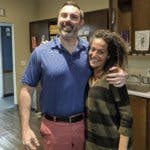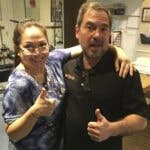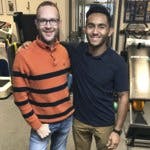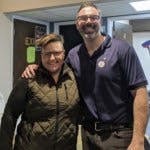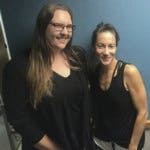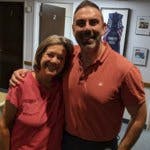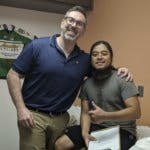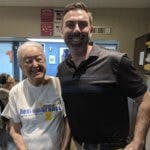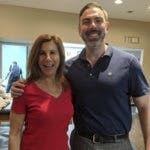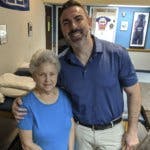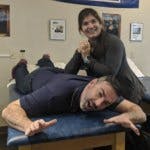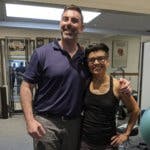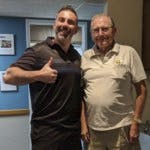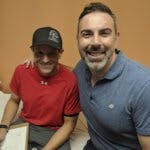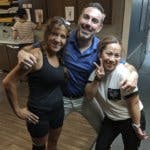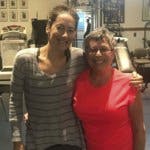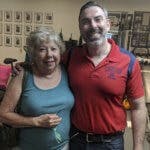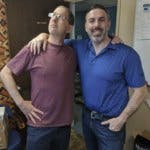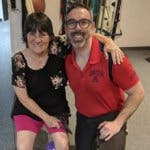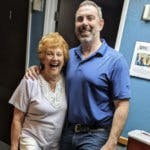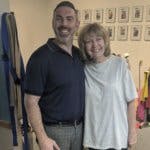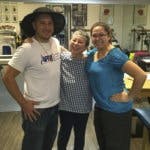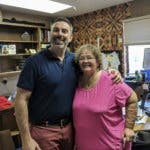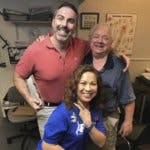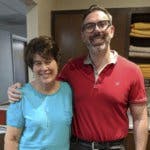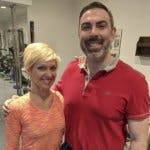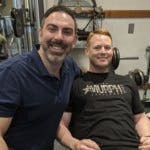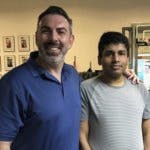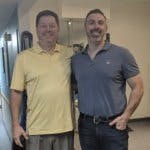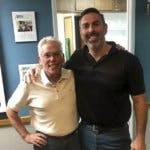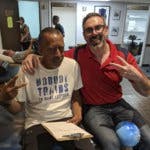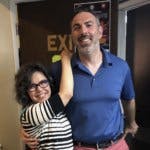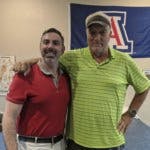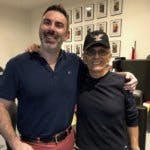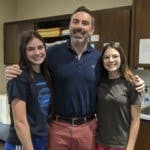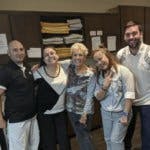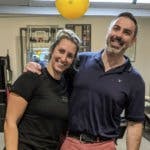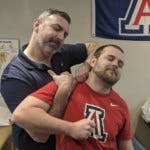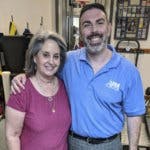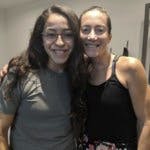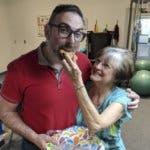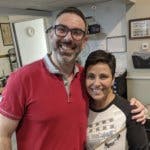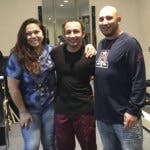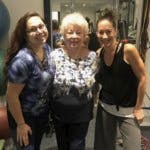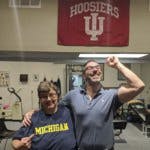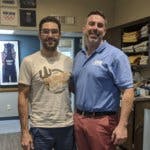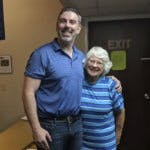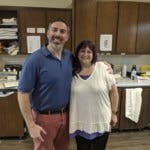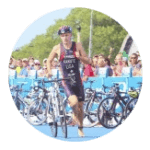Rated 5/5 based on 2 customer reviews
"I came here after a pretty serious surgery. The people here seem to be good at what they do and they are pretty easy to talk to. It's been great so far.
Thank you for being awesome, Applied Physical Medicine!"
Alex G from Tucson
Aug 29, 2025
From Google
"I am a runner and I began having hip and glute pain, even while resting the pain was always there dull, achy, and sometimes throbbing. I needed to begin training for my first marathon in about a month so I decided it was time to seek professional help. I saw a recommendation for Applied Physical Medicine in my local running group, I reached out to them and they got me in right away. Noah and Team are friendly, compassionate, and completely invested in helping people heal and also educating on how to become stronger and help prevent future injury. The atmosphere is laid back and fun.
With their services, guidance, and support, and by following their program at home, I am feeling so much better. The constant pain is gone and I am running further and stronger without the onset of pain, and I am recovering faster. I highly recommend Applied Physical Medicine, they are knowledgeable, dedicated, and they will help you heal and give you the tools to continue your recovery and get stronger on your own."
Jennifer Merritt from Tucson
Aug 28, 2025
From Google
"Had a rib out of place and resulting back pain. Noah and his team had me feeling better after 1 visit, and 90% pain free after 6 weeks. I kept up the exercises at home and can’t remember the last time I had back pain. They were even flexible with all the traveling I do for work."
Paolo De Luca from Tucson
Jun 10, 2025
From Google
"I had such a great experience! As a physical therapist I highly recommend Applied Physical Medicine, especially for sports injuries. Noah was excellent and he is very knowledgeable. He helped me get back to the sports I enjoy doing. APM lived up to their great reputation amongst therapists and athletes in the Tucson area!"
Amanda Ganey from Tucson
Jun 09, 2025
From Google
"Was having problems with my hip flexor and was struggling to run for periods of time. Worked with Noah and was able to prevent these problems from coming back and have been able to handle a much higher training load than before. I went to APM over the summer and the following fall was able to walk on to the Arizona XC team after not being recruited at all the previous year. The work I did at APM played no small part in this jump in fitness."
Connor Grusendorf from Tucson
May 19, 2025
From Google
"In March 2024 I texted Noah to update my progress because he had reached out to see how I was doing! I was frank, and shared that after an intense dry-needling and workout session my leg had been extra twitchy. Then I shared the GREAT NEWS! I had my first pain free hours that night, since my car accident in June. Any discomfort was worth it!!
When I got a referral for my shoulder pain and hand weakness Noah & Jason implemented a plan of dry-needling, stretch & strength. Within weeks I could put my coffee cup in my microwave without pain, or fear that I might drop my mug. And more impressive, I could take my jogging bra off over my head...pain free!!
I can't complement Noah and his team enough. The atmosphere is fun, friendly and the workouts effective for functional recovery.
Thank you, thank you. I will be keeping up on all those stretch and strength moves, and thinking of you many times a week."
Lynne O'Brien from Tucson
Apr 16, 2025
From Google
"I’m very impressed by their professionalism but also care for people. I originally called to ask what my co-pay would be for dry needling and was informed that I could save money by going to their sister facility, Tucson Sports Recovery. I had the pleasure of working with Dr. Noah himself, the owner of both facilities. He was personable and helpful and gave me ideas of how to address the cause rather than just the symptoms. He encouraged me to come to a few PT sessions to learn what I can do to strengthen and help myself. So, yes, the consult turned into me signing up for more, but I felt zero pressure to do it and believe he’s going to help. And they worked well with me, figuring out scheduling in a way that worked with my life and needs."
Meredith Lynch from Tucson
Mar 19, 2025
From Google
"Noah and his team are amazing! I love that they not only focus on getting you out of pain but also teach you how to prevent it and other injuries from recurring. I feel like not only has he addressed my immediate pain but he has improved my total health and fitness."
Audra Ashley from Tucson
Feb 20, 2025
From Google
"I had injured my foot and ankle badly. I had sprained ankle and torn ligaments in foot. After three months of babying it, it still was not healed. I saw Noah and he immediately knew what to do for me to encourage the healing. Dry needling tremendously helped and exercises as well. I also had a pinch in my ankle, which Noah determined was inflammation within the joint. After being with APM for 2.5 months, I FINALLY reached the healing I was longing for. My gait is much better, no more pinch in my ankle. Noah even corrected some bad walking habits I had. Thanks to Noah, I feel safer when walking now. Thank you."
Lisa De La Ossa from Tucson
Feb 14, 2025
From Google
"I was suffering from knee pain and APM helped me out. They were wonderful in helping me out. Noah and Jason are the very best."
Angela Barbieri from Tucson
Feb 14, 2025
From Google
"I've been seeing Noah throughout the years. APM has played a crucial role in getting me back in the game when experiencing pain or dealing with injury. He takes the time to listen and find ways to keep me going as opposed to sitting me out. Bonnie always communicates well getting me in quickly ."
James cardullo from Tucson
Feb 04, 2025
From Google
"Over the past year, I have referred dozens of clients, colleagues, friends, and family members to Noah and his team. Without fail, every single one of us has become pain-free and returned to our fitness routines."
Chase Bittner from Tucson
Jan 29, 2025
From Google
"Went to APM for lower back pain and pain in my left leg. Noah and his team got me started on some therapy and Noah did needling on my left leg which helped a lot. Their whole team is great and really cares. Thanks for all your help in getting me back to my old self. I would highly recommend them if you ever need physical therapy"
Joan Crawford from Tucson
Dec 24, 2024
From Google
"I started seeing Noah for a three month old knee injury that wasn't healing. Over the next three months we worked together a I went from non weight bearing back to full mobility. The progress has been phenomenal and I credit Noah's treatment plan and attention to the injury. Highly recommended."
Robert Neifert from Tucson
Dec 19, 2024
From Google
"Great insight and solutions! I highly recommend to anyone suffering from physical ailments at any level."
steve lamper from Tucson
Dec 06, 2024
From Google
"noah and his staff are great! dry needling has become a staple in my recovery process!"
joree sowards from Tucson
Dec 01, 2024
From Google
"Highly, highly recommend this place! Noah and his team offer great service and always there and ready for any injuries I have (seems like a lot recently). Everyone in Tucson knows him because he truly is the best and highly referred! Noah is very knowledgeable and personable. You not only know you’re receiving a great service, you enjoy it by working with Noah and his team."
Leah Ward from Tucson
Nov 22, 2024
From Google
Jordan Cook from Tucson
Nov 22, 2024
From Google
"I have been visiting Applied Physical Medicine in Tucson for several issues over the past few years and have made remarkable progress thanks to their exceptional team. The care and professionalism demonstrated by everyone there are truly outstanding.
The facility is clean, well-organized, and equipped with advanced tools to assist with physical therapy and rehabilitation.
I highly recommend Applied Physical Medicine to anyone in need of physical therapy or rehabilitation services in Tucson. Their commitment to patient care is truly exceptional."
Stephen from Tucson
Nov 22, 2024
From Google
"It was a long trek, but I am finally feeling like a runner again, and am considering my first race after almost 2 years off due to injury. The therapists never wavered in their optimism and continually adjusted the treatment plan to find what worked. Everyone in the office is so friendly and helpful. Highly recommend!"
Skye Elliott Gruen from Tucson
Nov 15, 2024
From Google
"I could not recommend more! Until coming here I had experienced a trend of people putting bandaids on my symptoms and my pain kept coming back. Noah took the time to understand and pinpoint the root of my pain and then apply unique treatments. I'm super grateful for his help and would definitely choose to come back for future care."
Riley Bk from Tucson
Nov 12, 2024
From Google
"My shoulder was in such pain for 6 months, then I started working with Noah and within 3 months I was out of pain! No surgery!! I am super grateful he was able to provide me with exercise progressions that built up my confidence so that I could return to my usual fitness routine."
Amy Vitt from Tucson
Nov 10, 2024
From Google
"After going to several physical therapy offices APM is the best by far! Everyone in the clinic is so kind and genuinely cares about helping you with whatever you need!"
Sophia Howard from Tucson
Nov 10, 2024
From Google
"Noah is a phenomenal PT. I was referred to him by a friend when I injured my hip a few months ago. I came here simply looking for help to rehab my injury, and I got so much more than that. I learned lots of exercises I can do on my own to help prevent injury. Noah is not only extremely knowledgeable but also incredibly genuine and friendly. He used a combination of dry needling and PT exercises for my treatment, which got me back up and healthy in a timely manner.
The APM staff (PT techs and front desk) are super friendly. Coming to APM feels like hanging out with a group of friends who genuinely care for you. 10/10 recommend."
Jessica Gomez from Tucson
Nov 10, 2024
From Google
"APM is a fantastic place to receive physical therapy. Noah has treated my family for multiple injuries, and we couldn't imagine going anywhere else."
veronica gehrich from Tucson
Nov 10, 2024
From Google
"APM has been like a home to me - with Noah and his talented team of PTs, PTAs, techs and front office staff caring for me throughout my journey to full recovery. I appreciate the advice and guidance - especially when i have flareups. They fix me up in no time to enjoy my weekends and get back to mobility. I especially benefit from needling and estim along with a wide range of excercise programs. I highly recommend this local business over any big box outfit - you wont regret the personal service and quality care!"
Allison Silva from Tucson
Nov 08, 2024
From Google
"I’ve been coming to APM on and off for close to a year now. I have worked with a variety of professionals at the office and all have been great. They have gotten me through some minor ailments and larger injuries that would have otherwise put me on the shelf for a while."
Eddie Keaveny from Tucson
Nov 08, 2024
From Google
"As an elite athlete, I appreciate Noah's attention to detail and his equal desire to get athletes back into their respective sports. Noah works tirelessly to make sure his clients understand their bodies and he is very through in his exercise prescription. He is hands on with all his clients and makes sure every exercise is done properly to enhance body awareness and healing."
Kaitlyn James from Tucson
Nov 08, 2024
From Google
"Noah and the whole team at APM were fantastic. I felt very supported as I worked through my knee and hip issues to get back to running."
Heather Rauch from Tucson
Nov 08, 2024
From Google
"Noah and Blake are both fantastic physical therapists and human beings. As someone who is very active but also suffers from chronic back pain, it’s a relief to have found APM. The PTs help me with the work I can’t do from home (or by myself), and have helped me learn to beat some of my symptoms before they start. And as an added bonus, they’re genuinely fun to be around. Highly recommend!"
Ami Hutchinson from Tucson
Nov 07, 2024
From Google
"I can't thank Applied Physical Medicine enough for their incredible support throughout my recovery journey. Thanks to Noah, Chris, and the entire team, I was able to overcome chronic pain and achieve a major milestone—I earned my black belt!
From the start, their treatment approach was holistic and effective. They incorporated a variety of techniques that truly set them apart, including dry needling, massage therapy, and laser therapy. The dry needling helped release deep muscle tension, and the combination of massage therapy and laser treatments sped up recovery and reduced inflammation. These cutting-edge treatments were key in helping me recover quickly and stay in peak condition.
What makes this clinic truly special is their personalized approach. They didn’t just focus on symptom relief; they addressed the root causes of my issues and helped me build strength and mobility over time. Whether it was helping me with joint alignment, muscle recovery, or pain management, they were with me every step of the way. With their guidance and expert care, I not only got back to full strength, but I was also able to push through my training and achieve my black belt—a goal I had been working towards for years.
If you're looking for a team that is genuinely invested in your recovery and performance, Applied Physical Medicine is the place to be. Noah, Chris, and the team’s expertise and commitment made all the difference in my journey to becoming a black belt. Thank you for everything!"
Jessica W from Tucson
Nov 07, 2024
From Google
"APM is the best! Whenever I have issues with my body. They are my go to. One might say they have the Midas touch. I first went to them with a 15 year issue and with really digging down to the cause, the issues, and imaging the area to really get accurate diagnosis. They don’t rush or assume, they are the mother hens of patient care. They took this rusty tin man and made me into a new Lightning McQueen. They are now my go to and sure enough get me up and running perfectly again. Don’t walk, run, unless it’s a leg issue, then hobble quickly to them! You won’t regret it!"
Matthew Pena from Tucson
Nov 07, 2024
From Google
"Great place for physical therapy. Therapists and Staff are amazing. Accommodating, friendly, with multiple therapies to help you get back to 100%. Highly recommend."
Keith Robbins from Tucson
Nov 07, 2024
From Google
"Noah is a ROCKSTAR!!! I never worked with a PT who pays attention to minor details the way he does. He cares about his patients, their goals and their recovery. I was unsure based off past experiences with other PT’s if he would be able to alíviate my pain… not only has my pain subsided but it continues to get better and better. I have recommended Noah to my loved ones because I believe in him and his ability to heal. Without a doubt I would say go see him, he’s magic! 🤩"
Jason beltran from Tucson
Nov 07, 2024
From Google
"Would highly recommend this place for anyone in need of physical therapy. It has a very kind and fun environment free of judgement and lots of great people that are happy and excited to help with whatever is ailing you."
Isaac Bendickson from Tucson
Oct 22, 2024
From Google
"These folks are absolutely Awesome!!!!
They are courteous, professional and attentive.
I saw results my first week there."
Ronald Gallardo from Tucson
May 22, 2024
From Google
"Outstanding Care!
Blake and his team are amazing! Their skill, knowledge, expertise, compassion, communication, support and so much more is unsurpassed.
They have been with me all the way from diagnosis, pre-op back surgery (3rd surgery) to my continuing post-op recovery therapy and strengthening regime. So very thankful, grateful and blessed through them and by them. Unparalleled Care!"
Sandy A. from Tucson
Apr 25, 2024
"Major help with severe sciatica. Blake was very knowledgeable in this area. All staff really nice. Very helpful at front desk as well getting appts set and dealing with insurance issues."
David Pinsky from Tucson
Mar 19, 2024
From Google
"APM is a fantastic place for physical therapy. Noah Abrahams really takes the time to get to know you and your goals and works with you to achieve them. He is a great practitioner with a personality to match. He has expertise with dry needling and seems to have a never-ending cache of exercises to meet your specific needs. All of his staff members are super nice and you always feel welcome there. I highly recommend APM."
Amy Olsen from Tucson
Feb 06, 2024
From Google
"Dr. Noah Abrams, and his entire staff here are absolutely incredible. They take the time to listen and figure out what the problem is and treat the source of the issue. I was living in significant pain for two years. Working with the team here, and the unique methods of treatment, we were able to change that. I would not be able to do my job as a firefighter or live the active lifestyle I do, without their help. A huge thanks to the entire staff here."
Patrick Bryce from Tucson
Jan 19, 2024
From Google
"Absolutely incredible experience here. The staff is friend and knowledgeable. I choose this office because they have a good reputation in working with endurance athletes."
Sam Brandt from Tucson
Jan 10, 2024
From Google
Kevin Johnson from Tucson
Dec 07, 2023
From Google
"Applied Physical Medicine really helped myself and my body get back to where it needs to be as an athlete. They handle their patients with care and will give you the proper treatment you need to make you feel 10 times better!!"
Taylor Bailey from Tucson
Dec 05, 2023
From Google
"I cycled through pain for two years with a strained medial head of my gastrocnemius. My PCP recommended physical therapy. I went to a "popular" office which ended up re-injuring me. After consulting an orthopedic surgeon at Tucson Orthopedic, he specifically advised me to go to APM. On my first evaluation, Blake recommended starting with a therapeutic dry-needling application. Having had good experiences with acupuncture, I agreed. For the first time in two years, my entire calf muscle system relaxed. Prior, it always felt like it was on the verge of going into contraction and locking up. Blake continued my therapy with e-centric exercises targeting my gastrocnemius and the medial head. After the first week of therapy, the difference was like night and day. My calf musculature was strengthening and I was beginning to rebuild my confidence in a complete recovery. Now, nine weeks later, the pain has completely subsided and I'm back to jogging ten minutes on the treadmill, pain-free (next week, fifteen minutes!). If you have a serious physical condition and want serious physical therapy, this is the ONLY place to go. Don't waste your time and money on another place that just gives you exercises to do. APM is the most knowledgeable, experienced, and committed physical therapy shop in Tucson, but don't just take my word for it, take a look at the "thank-you" photos and jerseys of professional athletes around the shop who have also been clients. If that doesn't convince you that you're in the best of hands, I don't know what will."
Terry Reed from Tucson
Nov 18, 2023
From Google
Sammy Fitz from Tucson
Oct 03, 2023
From Google
"The professionalism and care I received at APM far exceeded my expectations! I highly recommend them for any physical therapy you may need."
Ian Victors from Tucson
Sep 22, 2023
From Google
Amelia North from Tucson
Sep 21, 2023
From Google
"What an amazing place for all your physical therapy needs. Noah and his staff are kind, compassionate, very accommodating to your schedule, and extremely knowledgeable. They always make you feel like family. Noah Abrahams has been nothing short of a miracle in helping my daughter correct her pain, weaknesses, and help her understand her injuries. They have helped her reach new heights in training and competition. Would recommend them to anyone who has PT needs."
Travis North from Tucson
Sep 19, 2023
From Google
"I have never found a better physical therapist facility, and I have been to three here in Tucson. They have always addressed all of my concerns and issues, given me great direction in how to do the exercises at home for recovery, have given me a 360 degree approach in different ways to treat each physical issue like dry needling, tens machine, massage and hot therapy. I have had and have always been nothing but warm, welcoming and overall amazing people. Noah, the founder, treats his patients with respect and it feels like family. I have never had any scheduling issues, in fact whenever I have had something major happen they always get me in on the same day. I have nothing but positive things to say about Applied Physical Medicine! They have always helped me recover fully and my body wouldn’t feel the same without them. Thank you!"
Tiila Abbitt from Tucson
Sep 15, 2023
From Google
"Everyone was super nice and helpful"
Cave In from Tucson
Sep 08, 2023
From Google
"Applied Physical Medicine is my go-to for dry needling and therapy for back and upper shoulder pain. I train Brazilian Jiujitsu very regularly so injuries are common. After each visit I feel so much better. Blake has been working with me and I will continue to go back any time issues arise. 10/10 would recommend!"
Nicole Pavicich from Tucson
Sep 07, 2023
From Google
"I've worked with three physical therapists at this APM so far and they've all been wonderful. My back issues are resolving and they have been incredibly kind, patient, encouraging, and knowledgeable. I can't recommend this practice highly enough!"
Ori Green from Tucson
Sep 06, 2023
From Google
"I first started seeing Noah for a strained psoas. I was able to start feeling better after the first session. I then was in a severe car accident where I had a concussion and vertigo. Noah got me in immediately to begin the healing process. He fully got rid of the vertigo when all my doctor offered was medication. Noah is by far the best PT I have ever been to. He is kind, compassionate, and truly loves what he does.
Everyone at the office is incredible from the front desk to the techs to the PT’s. I highly recommend coming here for physical therapy."
Laryssa Brandt from Tucson
Aug 05, 2023
From Google
"They were absolutely wonderful, compassionate and very caring. I definitely would refer them to anyone."
Debbie Basinger from Tucson
Aug 03, 2023
From Google
"Noah and the rest of the staff helped me so much in my recovery. I am a college baseball player who had labrum surgery right before heading back to Tucson. Noah got my moving quicker than I ever could have hoped and did it with an energetic attitude. That energetic attitude is infectious and all the workers and all the other patients become a part of that energy. If I ever had a question it was always answered. I was used to it being a dread going into PT but here I was always excited to come in and get to work."
Wesley Curson from Tucson
Aug 03, 2023
From Google
"Noah, Amber, Blake & the rest of the wonderful team, really helped me with my neck and anxiety issues. I never dealt with anxiety before and the staff really helped me cope with different techniques to calm me down while working on my neck issues, also adding exercises to do at home. The staff is so nice and extremely personable. The office is a very comfortable environment too. I would definitely go back to them the next time I need treatment of any kind. "
Erica S. from Tucson
Jul 31, 2023
"Dr. Noah Abrahams is a fabulous PT. He is empathetic, a good listener, excellent at diagnosis, persistent, and fun to be around. His staff are friendly, knowledgeable, and professional. Noah has helped me immensely with a traumatic arm injury to regain more mobility than I thought possible. I can’t recommend Tucson Sports Recovery enough."
Teresa Hazen from Tucson
Jul 26, 2023
From Google
"What a difference between APM and the cattle call PT centers in town. The professional staff at APM (Alex, Blake, Noah, etc) handled my total knee replacement therapy with sensitivity and understanding. I would highly recommend APM for all your physical therapy needs. I’ll be back after my other knee surgery! Also, APM has one of the best and informative websites I have ever seen!"
Mike McDonald from Tucson
Jul 25, 2023
From Google
"Highly recommend Noah and the rest of the crew over at APM!
As an athlete it’s crucial to get on top of any issues asap and I know I can count on them to take the best care and keep me rolling!"
Kimberly Lucie from Tucson
Jun 29, 2023
From Google
Breanne Biggie from Tucson
Jun 19, 2023
From Google
"Hands down the best physical therapy experience I have ever had."
Paul K. from Tucson
Jun 01, 2023
From Google
"APM is fantastic. Blake Moreland has worked with our family through multiple surgeries and injuries. He is kind and compassionate combined with outstanding knowledge. He also knows just how much to push for improvement without frustration! Blake is a highly effective physical therapist and an awesome human being."
Judith Dyess from Tucson
May 29, 2023
From Google
"Dr. Blake Moreland at Applied Physical Medicine is a God-send. My story with APM started back in November, 2022 when I was post-op from an old sports injury. It was a rare pec-major repair surgery performed by Dr. Steven Mora in October, 2022.
Given my age and fitness level, I required a special protocol for recovery. Dr. Moreland took my case to heart and made a plan for me. He kept me on track and made adjustments as my conditioned improved. Blake is a unique kind of doctor that listens, thinks, interacts and provides options. Together, I felt like we became a team for my recovery. My injury is now fully healed and I"m on to strength building.
Also, Blake's sense of humor and humanity is one of a kind. He will heal your body and your spirit. I honestly could not ask for a better experience. I'll actually miss our PT sessions!"
Randy Melder from Tucson
May 03, 2023
From Google
"I have been coming to this office for dry needling to help with Bell's Palsy, and I cannot recommend APM enough. My therapist Alex is absolutely amazing! He is professional, compassionate, and super knowledgeable. He has helped me so much through this whole process, and my Bell's Palsy symptoms have already improved dramatically. Also, the front office staff are always so welcoming and efficient. Such an amazing experience, I highly recommend them for any therapy needs!"
Kindra Crocker from Tucson
Apr 11, 2023
From Google
"So knowledgeable and helpful"
Polly Schinstock from Tucson
Apr 05, 2023
From Google
"Katie is extremely professional. A very caring person. I highly recommend her without the slightest reservation. As a retired nurse, i highly recommend her."
Joe from Tucson
Mar 23, 2023
From Google
"I feel lucky and so thankful to have found Dr. Abrahams in the short time I was training in Tucson. I’ve been dealing with a recurring back issue on the bike and in one visit, Noah was able to diagnose with utmost competency and create an action plan to get me back to racing. He was determined and confident he would find the root of the issue and provide a solution, and he did just that. Can’t recommend him enough!"
Kaitlyn Maddox from Tucson
Mar 19, 2023
From Google
"Had a great experience with them. Thank you!"
Peter Van de Krol from Tucson
Mar 18, 2023
From Google
"Outstanding care, excellent with explaining everything and making us feel comfortable.. Very thankful to have found them!!!"
Luis Becerra from Tucson
Mar 16, 2023
From Google
"I am an active Powerlifter and Muay Thai student. I started coming to APM and seeing Dr. Noah after I did something gnarly to my left spinal erector lifting. It was immediately resolved with some dry needling and a quick adjustment. You also get mobility, PT exercises shown to you to further assist your healing process.
I have now trusted Dr. Noah and APM for a couple years to keep me in the best athletic shape of my life, and as a 37 year old, active powerlifter and martial arts student, that is the most important thing for my long term viability.
I have never had a billing issue, they have always been up front with the cost of each appointment. And I have never had an issue paying right then and there."
Steve R from Tucson
Mar 14, 2023
From Google
"I went to APM after a car accident and the care I received was exceptional. They scheduled me right away and got me on a plan utilizing various services. Later, when I had a reoccurring injury- they were able to see me quickly and help."
Rebecca Safford from Tucson
Mar 14, 2023
From Google
Jared Allison from Tucson
Mar 14, 2023
From Google
"Quality attentive care, hands on, cares about good care!"
Justin Carson from Tucson
Mar 13, 2023
From Google
"I’ve seen Noah regularly for over two years now. He and his team have helped my (chronic) pain levels fall to nearly non-existent levels and I’m able to work, workout and do all the sports I love. I recommend APM to all of my friends and co-workers."
Stephenie Deming from Tucson
Mar 13, 2023
From Google
"Applied Physical Medicine has helped my entire family in so many different ways this past year. Noah is the one doctor I trust, and he takes the time to listen. He really works with you as a patient to come to the right solution where others could just write you off as "good enough.""
Erin Meyer from Tucson
Mar 13, 2023
From Google
"Noah and his team have known me for many years throughout my struggle with ongoing low back issues after a hemilaminectomy in 2013. They have seen me at my worst and they have seen me at my best. Recently in September 2022, my issue decided to rear its ugly head. My first call was Noah. I won't bore you with all the details but here I am in March 2023 writing this review to sing the praises of APM! The staff is patient when needed, they push me when needed, they've seen me cry buckets of tears and they've wiped my tears, they sit and listen because as much of this is physical pain there's a mental and emotional side to all of this as well. Pain can absolutely take a human out, not just physically but mentally and emotionally as well. So many give up on PT or do it because their doctor "told them to do it" but I swear if you are invested, want to heal and feel better, and you can simply trust the process, then APM are your people! And trust me when I say, it's a process. You'll be tired, you'll be sore but you'll also be thankful that you gave APM a whirl!"
Brandy Holden from Tucson
Mar 13, 2023
From Google
"I always receive excellent from APM. I am an endurance athlete and several of the Physical therapists have helped me with address different issues over the last few years- hip flexor issues with Blake, Alex got rid of my high hamstring pain that was the worst, and Christy has been working with me on running form and pelvic floor issues. Also Noah has helped with intermittent low back and hip pain. I recommend any therapist who works at APM and the front desk staff has always been helpful and kind. I always leave there feeling better and hopeful that I don't have to live with pain and injury."
Natalie McConnell from Tucson
Mar 13, 2023
From Google
"Love Noah and his crew! Their services are great, and the facility is as clean as can be! Will definitely return!"
Kyle Faust from Tucson
Mar 13, 2023
From Google
"Noah and his team are the best! I had a foot injury and they were able to help me resolve the issue so I could get back to a full training load in just a couple weeks. Highly recommend if you are an athlete struggling with an injury!!"
Lily Vitt from Tucson
Mar 10, 2023
From Google
"I was experiencing long term hip/knee pain. Noah and his team were highly recommended to me so I scheduled an appointment. Noah personally assessed me and answered all my questions (and I had a ton!) I came home that day with a better understanding of what was causing the issue and a sense of hope after trying so many other things. His staff was knowledgeable and kind. I will go back if any other issues arise. I’m finally back to doing the things I love pain free. Thank you so much!"
diane wood from Tucson
Mar 06, 2023
From Google
"I’ve been dealing with ankle pain that is triggered by a previous hip injury for a year. Noah quickly identified the issue and has helped me make so much progress with getting more pain free days. I’m confident with time, healing and treatment I’ll be pain free in the future. Thanks Noah!"
Natalie Lyons from Tucson
Mar 06, 2023
From Google
"Noah and his staff really help to make a difference in your recovery process and long term goals. They help me keep my body dialed in and are one of the most professional clinics I've been to. As an active adult I'd highly recommend"
Tyler Chestnut from Tucson
Mar 06, 2023
From Google
"I had a great experience getting care here after almost giving myself tendonitis in both my ankles. My main physical therapist was Alex Griffis--he's great--but I enjoyed working with everyone there. It was my first time needing a physical therapist, and it was very effective. I'll definitely be going back if I injure myself again."
Steffon Brigman from Tucson
Mar 02, 2023
From Google
"Before coming to APM I had some major pain in my right elbow extending into my hand & up to my shoulder. Doing normal day to day activities was extremely painful. My PCM referred me to these guys and I started working with Blake. My first visit with him was great. He listened to all my issues I was having and we went from there. I began PT once a week for 2 months and now feeling great with no pain at all. He gave me home exercises to do and its working great. I highly recommend Blake for all your physical therapy needs. I will return for any future issues. Thank you!"
Kina Williamson from Tucson
Feb 15, 2023
From Google
"Have used Applied Physical Medicine through two shoulder replacements and a severely fractured ankle. My physical therapist is Dr Blake Moreland. He and the entire staff are kind, professional, and very effective at returning patients like me back to full function. I hope to not need physical therapy in the future, but if I do, I will return to APM."
Joseph Trueba from Tucson
Jan 18, 2023
From Google
"APM is in a league of its own when it comes to physical therapy practices. I worked with Noah to help with concussion rehabilitation and there were several times that my increased anxiety that resulted from my injury threatened to derail my sessions. Noah not only practiced incredible patience with me, but he also had the skill, acute awareness, and expertise to adjust the exercises or provide different cues to help me manage my anxiety. If something wasn't clicking, Noah adapted and changed the approach in his explanation and before you know it I could complete the exercise with minimal frustration. That is a special talent and one that any physical therapy patient is lucky to find in a physical therapist. Thank you Noah and APM!"
Maddy Ward from Tucson
Nov 16, 2022
From Google
"My lower back was in a lot of pain after hurting it while weight lifting and thought it would get better on its own until a year later when it felt terrible still. Blake was a great physical therapist and I loved having Sarah help me with some of my sessions too! My back felt so much better after a few months. Also loved coming in multiple times a week to the whole team. Thanks APM!"
Tara Autenreith from Tucson
Oct 20, 2022
From Google
"I've been here a few times for various knee and ankle pains. But this most recent visit is since I developed POTS/dysautonomia from COVID (ankle pain). My therapist Alex and team are patient and work well with my tachycardia and light sensitivities.
They make sure to turn off the lights when I was in the rooms. And waited for my heart rate measurements during exercises. The struggle is real for me most days.
It might not sound like a big deal — but for someone with chronic illness it made ME feel understood and not a burden.
Thanks to the team 💚"
Kimberly Lincoln from Tucson
Oct 02, 2022
From Google
"Always a great experience from the physical therapy to the billing department. I highly recommend this practice."
Rebecca Sanford from Tucson
Sep 21, 2022
From Google
"I went here for issue with a frozen shoulder. The physical therapist and assistants were spectacular. They made sure I understood my condition and what was needed to help me recover to the fullest while also becoming stronger in the process. I did have some billing issues when they were partnered with a different billing company. Which is why they now do their billing in house. When I talked with them about it they were amazing in working to get the issues corrected. They have worked with me each step of the way in providing me with payment options that work for me. Had I not communicated my concerns they would not have been able to help me.
I would HIGHLY recommend going here for your Physical Therapy needs."
Tabatha Heater from Tucson
Sep 19, 2022
From Google
"APM has gone above and beyond while caring for me as a fairly complex medical patient. Their knowledge, kindness, and efficiency is top notch. Additionally, they have advocated for my continued care more times than I can count. I have seen several of the PTs there and I can highly recommend each one of them without hesitation. I have seen many PTs over the course of the last 5 years, and I can say that without APM, my quality of life would never have been as good."
Stephanie H from Tucson
Sep 16, 2022
From Google
"My experience with the practice as a whole was fantastic. My Physical Therapist was Blake Moreland, and he was very professional in explaining the science behind the exercise and patient in demonstrating each one. I was so impressed with the basics and how much of an impact they had on addressing my pain. I feel equipped with knowledge for how to sustain my healing and prevent future injury.
The staff at the office is friendly and everyone works together to make sure your appointment is on time, and effective for the time frame you are there.
Over all I would definitely recommend this place to anyone who needs guidance and professional help on how to approach healing."
Lisa Long from Tucson
Aug 22, 2022
From Google
"Extremely knowledgeable. The staff is great and helpful. I was treated for a couple different issues, but the exercises helped my recovery process at home and not just while I was there. I highly recommend them."
Kasy Schug from Tucson
Aug 06, 2022
From Google
"My doctor advised me to go to Applied Physical Medicine, and I got amazing results! The entire staff and crew are excellent!"
Paul van Beverhoudt from Tucson
Aug 01, 2022
From Google
"I highly recommend Applied Physical Therapy. From triage to rehab they are topnotch."
Todd Sadow from Tucson
Aug 01, 2022
From Google
"Excellent team of physical therapists and trainers who are generous with their time. Very positive atmosphere and a well equipped gym with several excellent PT assistants. In only 2 months recovered from a debilitating frozen shoulder!"
sarah Fortna from Tucson
Jul 20, 2022
From Google
"Alex ( my PT) and the staff are truly great and knowledgeable! I came to them over a year ago with crippling pain in my right leg and low back. They diagnosed me with having under-active glutes and overactive hamstrings, due to my athletic endeavors over the years. It took time and patience but Alex was there every step of the way to guide me to where I am today…pain feee!! Everyone there takes care of you and makes you feel like family. I highly recommend them to anyone needing physical therapy. They will make you better!"
Brenda Holzer from Tucson
Jul 13, 2022
From Google
"I would like to give a big 'shout out' to Noah and his team at Applied Physical Medicine for helping me recover from a broken femur last October. Alex and Sarah were my therapists. They were very professional as well as all of the staff. I would recommend that anyone needing rehab give APM a call. Thanks to everyone at APM!"
Mike Cowan from Tucson
Jun 27, 2022
From Google
"Where do I begin. If I could give them 10 STARS I would. It's been about a month since my last visit and I still feel great. From the moment you walk in Kevin and Phil make you feel very special!!! I worked PT Alex and PT Sarah, both are amazing at what they do. All of the PTA both are rock stars also. What really makes them as a unit stand out is there customer service and the fact that everyone uses your first name while speaking to you and working with you. Really make it personal.if I ever need PT again I will go back here. I am still using some of my daily exercises to this day!."
WHITNEY CLABORN from Tucson
Jun 24, 2022
From Google
"Staff is professional and caring. All of them especially Sarah and Alex are very knowledgeable and always listened to my questions with great feedback. With their help and encouragement my recovery from back pain was a success. Thank you for being a top notch business with excellent patient care offering physical therapy that works!!! Five stars!!!"
Gloria Myers from Tucson
Jun 22, 2022
From Google
"I am a dance major at the University of Arizona, so I am a high-performance athlete and student in the Tucson area—after falling down the stairs and spraining an ankle, I searched for the best Physical Therapy and integrated treatment clinic, stumbling upon APM! I worked with Christy Lee, who helped me pinpoint and strengthen weaknesses on both ankles, hips, and my core! The office is welcoming and such a productive environment. I was only able to come in three times, but received laser treatment, dry needling, and manual treatments in addition to exercises and mobility tid bits that I can do on my own. I highly highly recommend this place, and will return if I ever need guidance or treatment in the future!!"
Skylar Fry from Tucson
May 11, 2022
From Google
"Had two total knee replacements after 30 years of grade 4, horrible arthritis. The first in September, which went really well. My insurance agent actually found this place for me, and when I went in a week after my first surgery, I felt positive vibes right after walking through the door. The staff was friendly, attentive, and immediately knew my specific situation and what I had to do to get back on my feet. Blake was the first knee specialist I saw at APM, and he got me up and running (ok, not literally running), but walking, in record time. He's not only a good PT, but a former wound care specialist who was able to examine my surgically repaired knee and tell me when it was ok to get back in the pool... he caught a hole in my knee that neither my surgeon's assistant, or myself, saw -- which saved me a lot of misery and possible infection. By the end of my first week at APM I had less pain in my knee than I had in years. By three weeks I was standing on it, and bending it over 105 degrees, and managing steps without a walker. My 2nd operation, in February, was absolutely the opposite of the first -- completely brutal - and this time I required a lot of help, especially since the tourniquet used in surgery tore up my hamstring. Both Blake and Sarah and the rest of the staff were exceptional, and they got me through a really tough time and some of the worst pain I've dealt with in my life. I've never had a better experience with physical therapy, and anyone who's been through a total knee replacement would understand how important it is to receive excellent care and instruction through that process. By the time I finished, I was honestly a little sad to say goodbye. I cannot recommend APM enough."
JM Prescott from Tucson
Apr 25, 2022
From Google
"I have been a patient of Alex Griffis for the past few weeks. What a smart accomplished therapist! He knows his stuff! Alex’s assessments are right on. He is very honest, caring, professional, and cautious. Thank you, Alex, I’ll be following up in Whitehall, MI."
Marcia Brichan from Tucson
Apr 25, 2022
From Google
"I have immense gratitude for Kelly Carroll and the rest of the staff at APM for patiently guiding me through my journey the past couple months to significantly improve my patellofemoral pain syndrome that was causing even just walking to be a difficult task. Kelly was extremely kind and supportive, being my cheerleader when I didn't believe long-term knee pain relief for me was possible. With the aid of dry needling at the start and diligently following the exercises that were given to me throughout my time here, I went from feeling handicapped to being able to confidently hike, rock climb, and cycle again! Thank you all so much, I will definitely come back if any future injuries occur!"
Yesica Furrow from Tucson
Apr 18, 2022
From Google
"I started seeing Dr. Blake Moreland around October 2021 for a bulging L4/L5 disc and a hypersensitive right QL that was super flared up! He and his team (Stephanie, Sarah, Vinny) were all so helpful in working with me, and ensuring I was equipped with exercises I can do at home to continue progressing. I think Blake’s dry needling really made a huge difference in my recovery and I’m so grateful for his expertise in that. I’d definitely recommend Blake/APM, especially those injured athletes who are eager to get moving again!"
Josie Romero-Pala from Tucson
Apr 13, 2022
From Google
"I can’t adequately express my gratitude to the entire team at APM. The reception staff, the office manager, the assistants and physical therapists all made me feel welcome and confident that they genuinely cared about me. Blake was my primary therapist and is a gem! He saw me through 2 shoulder surgeries in one year, providing very skilled care with such compassion. When I felt discouraged, he was my cheerleader and when I was progressing, he was like a proud parent. 🙂 He knew how to push me when I needed that while also respecting my need to take a break sometimes. Blake was absolutely key to my regaining shoulder function. I miss seeing all the great people at APM and I highly recommend them for any physical therapy one might need. Thank you all so much!!"
Janet Ross from Tucson
Apr 06, 2022
From Google
"I feel very fortunate to have been referred to APM for my physical therapy needs. From my first visit to my last today I was treated with care, respect and professionalism. Blake fully understood and addressed my issues and I started seeing results after my very first session. The entire staff impressed me with their kindness, attention and an overall very happy atmosphere throughout. I truly thank Blake, Sarah and all of the staff that worked with me. I am very pleased with the vast improvement I have made due to the outstanding APM team. Many, many thanks!"
Marilyn Austin from Tucson
Mar 29, 2022
From Google
"I have a genetic condition (hEDS) that isn't well known and I have always struggled to find medical providers who know how to treat it correctly and not cause more damage. I am so thankful I found APM and specifically my amazing PT Cara Payne. She is very knowledgeable and extremely caring. She has gone above and beyond many times for many of her patients. The owner and all other staff are also caring and very professional. I highly recommend Applied Physical Medicine and all their staff."
Charia Underwood from Tucson
Mar 14, 2022
From Google
"I had an amazing experience at APM after my Achilles’ repair surgery. The entire staff front to back was extremely knowledgeable, friendly and helpful. Great atmosphere, equipment and experience overall. Very happy with the progress I made here and will definitely be back the next time I hurt myself. Can’t say enough good things about this place!"
Austin Cline from Tucson
Feb 25, 2022
From Google
"After battling IT band pain for 2+ months and seeing a different PT in the area, I switched to Noah Abraham and he got me back to running within 2 weeks. He immediately saw what the imbalance was and knew exactly what to do and the exercises that would get me back to running. I had a half marathon on the calendar in just a few months and didn't know if I'd be able to get to the start line healthy. With Noah's support, constant reassurance and treatments, I was able to run a best time in the half marathon and most importantly, pain free! Highly recommend Applied Physical Medicine."
Jori Galles from Tucson
Feb 15, 2022
From Google
"Blake Moreland at Applied Physical Medicine is by far my favorite physical therapist that I have ever had. I started going to APM last year for my TMJ disorder. Right from the start, Blake made me feel welcome and cared about my health. He curated a plan that fit perfectly with my needs. Before I started treatment, my pain level was a 10/10 and I could barely function. Blake has improved the quality of my life immensely, and for that I will always be grateful.
Also, shoutout to the rest of the staff, you guys are the real MVPs and you guys always brighten my day!"
Jenna Brandkamp from Tucson
Jan 25, 2022
From Google
"After years of ups-and-downs following a neck injury, I finally feel like I can lead the active life I want again without constantly worrying about re-injuring my neck. Noah is a truly knowledgeable problem solver that can always pinpoint the muscles needing work, and the entire staff is friendly and encouraging. Last week I helped my husband rebuild our 20’x10’ deck and felt great afterward! Definitely the best physical therapy experience, and I am incredibly grateful."
Amanda Semanko from Tucson
Jan 20, 2022
From Google
"I traveled into town for a few days to see family during the holidays. Noah and his team worked me in despite an already packed schedule. I am super excited to implement the activation exercises I learned at APM into my training plan. As a former college athlete and as someone living an active life style I highly recommend APM to anyone in need of a PT. If I lived locally I would be a regular for sure."
Karina Jensen from Tucson
Dec 27, 2021
From Google
"My deepest thanks to the team at Applied Physical Medicine. They patiently worked with me, answering all my questions and constantly upping the challenge of my physical therapy. As a result I have greatly reduced pain and increased mobility. The entire staff was caring, friendly, and engaging and the sessions were always on time. I highly recommend this physical therapy clinic."
Raina Maier from Tucson
Nov 01, 2021
From Google
"I've been going to APM for 6 months now and this has been one of the best experiences I've had with physical therapy. Blake and Matt and all the trainers are super welcoming and fun to be around, and it motivated me to make more routine visits that were necessary for me to deal with my chronic injuries. Would recommend to anyone looking for a young and upbeat environment in PT."
Adam Owens from Tucson
Nov 01, 2021
From Google
"Loved my experience and the staff is awesome. I saw Stephanie for laser treatment (I thought this was super helpful!) as well as a few team members for PT. Christy was my PT for a majority of my treatment. She shared a ton of knowledge and helped me with the functional impact of my issues which were based in women's health/post-surgical. I would recommend her for any active individuals and anyone seeking post-surgical manual therapy. Really positive experience!"
Kerbie from Tucson
Oct 17, 2021
From Google
"I was extremely please with my therapist, Christy Lee. She was as personable as she was professional. I felt completely at ease under her care."
paula patterson from Tucson
Oct 14, 2021
From Google
"Applied physical therapy was so amazing. I have been dealing with vertigo for 30 years and Dr Alex has been working with me for 2 months
and I have been symptom free for over a month. I am so grateful to him and Applied Physical medicine for helping
me."
muriel WIELAND from Tucson
Sep 10, 2021
From Google
"I had debilitating shoulder pain from a deep muscle spasm and was referred here by my physician office. I was just stupid with the pain. But working with Alex and Matt and the rest of team has just been a great experience. I learned practices to do at home that I continue. My pain began resolving almost immediately and today I actually feel good, and stronger. I cannot recommend them highly enough."
Jenny Kendall from Tucson
Sep 01, 2021
From Google
"I had a total knee replacement. APM was great. My PT Alex was great and it did not matter which PTA I was seeing because they all knew me and were all on the same page when it came to my therapy. Can't say enough about these folks."
Bruce Dawson from Tucson
Aug 27, 2021
From Google
"I came in with debilitating lower back pain. After only a few sessions there was marked improvement in pain and numbness. I was originally uncomfortable with dry needling as well, but Christy made me feel very comfortable and now it’s something I look forward too."
Scot Stouffer from Tucson
Aug 11, 2021
From Google
Selene Rivera from Tucson
Aug 09, 2021
From Google
"I went to APM after foot surgery and after 4 weeks of therapy by various team members with different ideas and approaches, my foot is ready to go! I’m back in shoes, back at the gym and feeling good. All the exercises were easy to pick up and continue at home. Thank you APM team…I’ll be back when I need you again!"
Paula Lundquist from Tucson
Aug 05, 2021
From Google
"I suffered a very painful and debilitating condition that involved my piriformis muscle and sciatic nerve. After considering several options, I decided to try APM. That was one of the great decisions of my life. The entire staff is cheerful, positive, and caring.
For me, the greatest hero is Alex. He's empathetic, very knowledgeable, and very competent.
Alex suggested dry needling treatments. I was quite skeptical of that technique, and agreed to try it only after a week of researching it online and thinking about it. The first treatment gave me some relief; each subsequent treatment gave me additional relief. Since my last treatment a month ago, I've been completely free of pain.
Alex gave my life back to me."
G H from Tucson
Jul 08, 2021
From Google
"Just want to say I received excellent care at APM. The staff is extremely helpful and friendly. Best customer service and knowledgeable staff. Highly recommend this company."
Dorothy Elias from Tucson
Jul 06, 2021
From Google
"APM is awesome! The staff is incredibly friendly and helpful - everyone went above and beyond to make sure I was healing properly and provided me with the tools necessary to continue my recovery. Blake and Matt were very knowledgeable and helped me recover quickly and effectively while keeping the sessions fun. Highly recommend!"
Maddie Hubbard from Tucson
Jun 30, 2021
From Google
"I'm a medical student interested in neurology who unfortunately had to suffer from vertigo three weeks before my board exam. My mother found Dr. Blake G. Moreland, PT, DPT by Googling and I just didn't think a maneuver would help me alleviate vertigo, nausea, vomiting and worsening symptoms when studying. I honestly thought that I won't be able to take the test or go back to being "normal again." I was diagnosed with horizontal canal BPPV which is apparently harder to treat. But Dr. Moreland went above and beyond to help me get better so that I can get back to my normal life. He provided reassurance, diagnosed and provided the proper maneuver that alleviated most of my symptoms within a week or so. I would say the most disturbing symptoms of getting nauseated and dizzy from staring at my computer screen to study were adequately managed by 2-3 treatments. Residual but tolerable symptoms took some time to go away. With his help, I was able to study for the exam, tolerate foods without vomiting and still be able to drive to my exam site. I truly appreciate his expertise in treating vertigo and passion for addressing it with reassurance, accuracy and confidence in his diagnosis and compassion for those who suffer from this terrible vertigo/BPPV. The best treatment for vertigo from BPPV is the correct maneuver (don't blindly do Epley at home) and Dr. Moreland is THE PERSON for it. I absolutely recommend him for anyone suffering from vertigo from BPPV without reservation."
Eunhye Lee from Tucson
May 18, 2021
From Google
"APM came highly recommended and did not disappoint. Dr. Blake Moreland is a skilled and knowledgeable PT. I started running for the first time during quarantine. About a year into suddenly overusing my middle-aged body, I developed some hip and knee pain. Blake identified the issues and the solutions. He introduced me to the wonderful and wild world of dry needling to reactivate my seized up glut meds. And he taught me how to get a deeper stretch in my IT band to help prevent the knee pain. After a couple months, I’m pain-free and back to training."
Katie Trushell from Tucson
May 17, 2021
From Google
"APM has a very qualified staff and everyone I met and dealt with were very friendly, cooperative and helpful. The atmosphere was not stuffy like other PT offices I've been to. Instead music was provided in the background and lots of action was all around me during my exercises. All the attention I received from electronic, dry needling, laser and hands on was helpful and my pain was eventually reduced substantially to be released after about 3 weeks. Can't say enough about the staff and their helpfulness. Thanks APM."
Eli Curiel from Tucson
May 15, 2021
From Google
"Noah is a true expert! I had been having knee issues for years and after one session and continuing the mobility and strength exercises I have been pain free. Wish there were more stars! Thanks Noah and the team"
Ryan Standish from Tucson
May 04, 2021
From Google
"Great place to be. All ways fun to be here and great people."
Cody Calles from Tucson
Apr 07, 2021
From Google
"Hands down best PT and body work in my life. As a former competitive athlete I have seen/been through a lot. After 1.5 yrs of pain and a compromised back from having my child something had to change. I spent 4 weeks with Blake on PT, needling, laser, active release chiro. and I am pain free and back to my usual sports and activities. So so grateful - and widely impressed. Fun staff and team on site as well."
Blair Lauren Brown from Tucson
Apr 07, 2021
From Google
"Dr. Noah really knows how to take care of a patient's underlying injury or muscle weakness."
Adam Katz from Tucson
Apr 06, 2021
From Google
"Incredible staff and friendly atmosphere. As a high performance athlete, I have found the expertise and knowledge of the therapists to be excellent. The front desk staff are always welcoming and accommodating and I feel safe and comfortable during my sessions."
Joanna Brown from Tucson
Apr 03, 2021
From Google
"APM is by far the best place to go for physical therapy! I had been nursing a couple of injuries throughout the year, and considered forgoing the tournament i've been preparing for year round. I was fortunate to be referred to this clinic and this team of therapists and techs. The flexibility in scheduling was amazing, and the front desk was friendly and easy to work with. The seamless transition between therapists was synergystic and accommodated my hectic schedule. The level of professionalism and empathy I felt in this clinic, made me feel as if they really cared for my well being, they were truly invested in seeing me get better. I was able to return to work and perform my best during the competition . A special thanks to Matt, for being there at the tournament, he was an invaluable asset in post-match recovery and keeping my body in one piece through the whole competition! Very thankful and blessed to have ran into this bunch, so much so, that I now volunteer and shadow at APM. Love this place"
jose coronado from Tucson
Apr 02, 2021
From Google
"Definitely recommend, everyone is kind and helpful. 10/10"
Zara Macias from Tucson
Mar 18, 2021
From Google
"APM is amazing! They truly care and treat you like family. When I started PT in October, from a shoulder injury, I could barely raise my arm. I was so worried. But Blake was amazingly patient and encouraged me to do a little more each day. Eventually I got better and now I’m almost back to normal. The pride that the staff takes in their work is remarkable. They take the time to get to know each patient and tailor a program for each individual. Choosing APM was the absolute best decision I made for my recovery. I’d recommend them to anyone who needs physical therapy!"
Jessica Sayles from Tucson
Mar 16, 2021
From Google
"I had a hip surgery (femur fracture) after a bicycle crash in April 2020. After couple health issues related to my hip surgery I started working with Noah and his team in December. I walked in with more than one issue and pain. With all the tendon and muscle issues I had it was way overdue to see professional help.
Noah and his team are spot on and I am able to swim and bike again. Running is still a hurdle for me because of the huge mess I have on my muscle and tendon.
Nevertheless, every time I walk out of PT I feel some percentages better than the week before.
I never believed in the power of dry needling. But this helps.... and feels so good afterwards.
With all the techs recommended exercises/ stretching I feel so much better. They are easy to perform at home and never overload your capability.
It’s also a very friendly and funny atmosphere. Everyone is always happy and helpful.
Thank you so much for all you do."
Sascha Spaeth from Tucson
Mar 15, 2021
From Google
"Wonderful experience with APM. Dr. Blake was a wonderful therapist, and the staff was always helpful and kind."
Hassan Adel from Tucson
Mar 07, 2021
From Google
"Noah is my hero!
I had a back/hip joint injury and the team at Applied Physical Medicine was AMAZING! I was able to get back in the gym and train safely. I highly recommend them!"
Sarah Condon from Tucson
Mar 05, 2021
From Google
"Such a great place to go for PT! Blake does a great job of working towards your needs and it helps that he tries to get to know you as well! Highly recommend APM! Everyone is friendly and accommodating."
Niraly Patel from Tucson
Mar 04, 2021
From Google
"The best experience I've ever had at PT! Blake is very knowledgeable and has helped me heal from severe pain from several different injuries (yes, I keep coming back!). He's a good listener and a compassionate person. I always feel like I'm in good hands with Blake. The entire staff are super professional, knowledgeable and fun to work with. I've recommended APM to my friends and now they come to see Blake and the rest of the friendly staff!"
Marcella Caldwell from Tucson
Mar 04, 2021
From Google
"I can't recommend APM enough. Blake and his team are amazing. Both of my parents and myself have gone to APM. I have been going to APM since November of 2020.
Since then I have been feeling much better and enjoying going to physical therapy.
If you're hesitant about trying out APM, don't think twice about it. I promise you that your condition will improve if not go away."
Jake Burnett from Tucson
Mar 03, 2021
From Google
Eric Touhey from Tucson
Mar 03, 2021
From Google
"Noah is an amazing PT and has a great team at APM. I've worked with plenty of physical therapists over the course of my professional racing career (mountain biking), and Noah stands out for his training in a bunch of modalities and his ability to address the root cause of issues. I trust him and he knows what he's doing."
Chloe Woodruff from Tucson
Mar 02, 2021
From Google
"APM is a great place to go for injuries or general physiological health. As an athlete I have many unknown pains and strains, and Noah was able to precisely find the cause(s) of my injuries and fix them. I received needling, physical therapy, and utilized the Tucson Sports Recovery center at Tucson Strength. Even if you are not an avid athlete, I highly recommend APM as your first choice in recovery and health. They made me feel like I am part of the APM family immediately!"
Paige Redman from Tucson
Mar 02, 2021
From Google
"Everyone at APM is super helpful and friendly. Noah goes above and beyond for his athletes and makes sure you have the tools and exercises to keep yourself healthy. He has created a great community around APM that always feels welcoming and supportive to everyone regardless of the reason you’re there. I recommend him to everyone I know!"
Cherry Niel from Tucson
Mar 02, 2021
From Google
"Top notch facility with fantastic staff."
Dre from Tucson
Mar 02, 2021
From Google
"Noah has always taken the time to help me with his busy schedule. Keeping me healthy and comfortable on the bike is most important to me and Noah was able to help me with that."
Max Roth from Tucson
Mar 02, 2021
From Google
"Blake is the best! I had a gastrocnemius and knee injury during a snowboarding crash at the beginning of the season and couldn't walk for a month. I went to AMP and saw Blake as my main PT and still hoped I could get back on the slope before the snow season ends. Blake and the whole team tried everything to help me to achieve that goal in less 2 month. I enjoyed my time working on my knee with everyone in AMP and became friends with them. I hope I don't get hurt again but now I have the extra confidence on the rail or in the air that if I do they will fix me again 🙂 Thanks everyone in APM!"
Tian Gu from Tucson
Mar 02, 2021
From Google
"I couldn’t sit down. I couldn’t walk across the street. I couldn’t lie down without pain. Thanks to Noah, I’m playing golf tomorrow!"
Doug Frisch from Tucson
Feb 01, 2021
From Google
"I would highly recommend Applied Physical Medicine. I came in with a lot of back pain. Blake has really helped out a ton. I have little to no pain now! Not to mention the awesome office staff and PTAs."
Emily Landsverk from Tucson
Jan 22, 2021
From Google
"I went to APM due to a foot injury, and I am glad I did. The front desk handle all the paperwork for the insurance, and they communicated to me all the pertinent information, including setting up all required appointments.
I met the the team that took care of my injury, and physical therapy started right after....Dr. Blake Moreland examined my injury, and very quickly he diagnosed the problem, and orders were written to start physical therapy.
After a few weeks, I was as new as before my injury. The whole team worked together with one thing in mind,
and that was let’s get him back to run.
Thank you to all!
Jack Gonzalez"
Joaquin Gonzalez from Tucson
Jan 21, 2021
From Google
Heidi Horwitz from Tucson
Dec 22, 2020
From Google
"I started going to applied physical medicine in early summer for some needling work. I found that the staff was very helpful with everything I needed help getting back in check. Blake was super helpful with providing knowledge for long term recovery."
Winslow Fruits from Tucson
Dec 21, 2020
From Google
Mikhaylo Mikhaylik from Tucson
Dec 19, 2020
From Google
"I would highly recommend APM for your physical
therapy needs! Everyone on the staff is truly there to help you feel your best. I had an ACL repair about two years ago and I was still experiencing significant pain and reduced physical capability due to the pain and lack of mobility. In a span of 6 weeks my PT, Blake, provided me with comprehensive care that nearly eliminated the pain I was in and allowed me to get back to activities I enjoy, such as running. I am so grateful for the care and kindness I was shown while at APM!"
Courtney Pehl from Tucson
Dec 16, 2020
From Google
"This was the second time I had badly injured my right ankle in a short period of time, and I was concerned that I would have major difficulty in recovering, especially when my primary doctor was talking about possible surgery if I didn't recover. In just 5+ weeks of therapy with the APM team so far my recovery is making leaps and bounds which has given me hope and confidence in my recovery. I was at first extremely skeptical and intimidated about Blake's needle therapy...however, I now actually look forward to that part the most because I am fully persuaded by evidence that it has been the most effective part of my therapy. The facility layout is very comfortable, and the whole team is amazing at showing how much they care for me and my recovery. I'm so glad I chose APM because they have helped me more than they probably realize with returning to the field in my trade, as well as every area of my personal life as well, and for that I am forever grateful to them all!!
You will not regret choosing APM therapy"
Paul Walker from Tucson
Dec 06, 2020
From Google
"I seen Blake for a pinched sciatic nerve. His needle work and pt experience made it so I can walk and be pain free. Truly an amazing practice and ptt. I can't tank APM for all they have done to help me recover and get me back to work."
Matt Erhardt from Tucson
Nov 20, 2020
From Google
Malinda Addis from Tucson
Nov 16, 2020
From Google
"This is the place to go for your physical therapy needs. I have had lower back/glute/hamstring issues lately that distruped my life, and if it wasn't for Dr. Blake Moreland I would probably be curled up in a corner crying and totally useless. He is a phenomenal therapist and a blessing in my life. He has worked tirelessly to make sure I am healthy again and that I stay that way."
Kristen Biddle from Tucson
Nov 05, 2020
From Google
"The PT staff including the therapists and techs are experts in their field. The facility is not fancy on the surface but they are good where it counts. They healed me all three times I’ve had back or foot problems. I don’t want to have pain again, but if I do, I’ll be back at Applied Physical Medicine to see Blake, Matt, or Cara. I trust them all."
Dan Grossenbach from Tucson
Oct 28, 2020
From Google
"Blake and his PT staff saved me. Neck and back pain was shutting down my body. I didn't know what else I could do. Blake showed me a new world where I could manage my pain. Each training session gave me hope and I was able to show off my progression within a few weeks. Thank you, you're amazing!"
John C from Tucson
Oct 18, 2020
From Google
"Blake was great! Came up with a treatment plan and got me pain free quickly. I have nothing but positive things to say about APM.
EDIT: So I hurt myself again. This time I had Christy and Matt working on me. They were awesome. Got my pain low enough fore to go back to work after a few visits and gave me a bunch of exercises to keep doing to prevent future injuries."
William Croasdale from Tucson
Sep 22, 2020
From Google
Kris Van Horne from Tucson
Sep 18, 2020
From Google
"Hands down the best treatment I have received here in Tucson! Blake really cares about his patients and has gone up and above on my behalf in many ways! Do yourself a huge favor and come see him for all the various treatments he uses and his excellent skills!"
CJ Burnett from Tucson
Sep 17, 2020
From Google
Amy Holzgrafe from Tucson
Sep 17, 2020
From Google
Josie Calabrese from Tucson
Sep 16, 2020
From Google
Mary Gravelle from Tucson
Sep 16, 2020
From Google
"I have worked with Noah for many years, even at St Josephs Hospital. Dr.Abraham care and service has allowed me to continue in my profession of choice. When accidents occur or when I forget that I’m not getting any younger, his office has appointments available when I need him/them the most."
Katie Sandusky from Tucson
Sep 16, 2020
From Google
Anna Rick Lisk from Tucson
Sep 16, 2020
From Google
Shirley Griggs from Tucson
Sep 16, 2020
From Google
Linda Brady from Tucson
Sep 16, 2020
From Google
"Noah and his team are top notch. They deliver 1 on 1 care and we're always direct with their answers. I would and have recommended them to several others who all have thanked me for the recommendation."
Steven Maslowski from Tucson
Sep 16, 2020
From Google
Jaimison Slyter from Tucson
Sep 16, 2020
From Google
"Personalized patient care. Helped me correct some imbalances no one previously caught and has me cycling stronger than ever. Creating a resilient body and long term plan"
Tyler Chestnut from Tucson
Sep 16, 2020
From Google
Alvin Moore from Tucson
Sep 16, 2020
From Google
"The place to go for individual treatment"
Jack Juraco from Tucson
Sep 16, 2020
From Google
"I love Applied Physical Medicine ! They have helped me so much with so many different issues ... Noah and ALL of his staff is EXCELLENT!"
Yadel Vizcarra from Tucson
Sep 16, 2020
From Google
"Noah and his team are excellent!
The staff is courteous & knowledgeable. The facilities are very clean!
You will not find another PT in the area that provides the level of service APM is able to deliver.
Thanks Noah!!!!!!!"
William Martin from Tucson
Sep 16, 2020
From Google
"Noah, and everyone that works with him, is top notch! He has helped me get back into Ultimate frisbee and hiking and has helped my mom with various pains. Oh, and he’s funny!"
David Gleeson from Tucson
Sep 16, 2020
From Google
"I would absolutely recommend Tygiel Physical Therapy. I began seeing Noah a couple of weeks after surgery. I was told by everyone that I wouldn’t be lifting anything heavy for a very long time (well over six months). I was told so much misguided information before coming to APM and had no confidence to do anything in the gym at all. Noah and his staff gave me the information I desperately needed, minimized my pain, and gave me the confidence I needed to get back into lifting. Less than 2 1/2 months after my surgery, I’m already safely making pain free PR’s in the gym thanks to Noah and his team. Noah and his staff are so incredibly friendly and knowledgeable and make every client feel important. Noah even took his own time outside of the practice to personally help me at the gym on multiple occasions. He helped me make modifications to every exercise I was limited to. I can see at the gym that he’s truly invested in each one of his patients. I’ve never seen a more dedicated therapist. I am so thrilled with the progress that I made in such a short amount of time, it’s truly amazing. As long as I live in Tucson, I will never go to any other physical therapy practice!"
Bailey Muntz from Tucson
Sep 14, 2020
From Google
"Noah and the team at APM helped me recover from a ruptured Achilles and the care I received was top notch. Noah helped navigate both diagnosis and my eventual surgery for the injury thanks to his healthcare contacts and I felt very little stress about the process. All the team members at APM were engaged in my recovery and I would recommend anyone needing physical therapy to seek out APM for their needs."
Dominic Colella from Tucson
Sep 10, 2020
From Google
"Obtaining treatment at Applied Physical Medicine has been a game changer! I received treatment for lower back/hip pain. Over the course of eight weeks, my pain was greatly reduced, my mobility increased, and I learned how to maintain my improved health. The staff is knowledgeable, friendly, and professional. Dr. Abrahams went above and beyond to make sure that I had a positive experience throughout my treatment."
Ellen Staab from Tucson
Sep 06, 2020
From Google
"Before I made it to APM I hadn't run in months and was considering quitting. I suffered from low back pain that got worse after running and hurt the most while sitting at my desk. Driving was bad too. I lived with it on and off for four years.
I wish I found APM sooner! They found my problem on the first visit and worked with me over the course of a few weeks to eradicate it. My pain is mostly gone and I understand what to do when it comes back. The team there is great.
Would highly recommend APM to anyone!"
Jason Marietta from Tucson
Aug 28, 2020
From Google
Ksenia Ochap from Tucson
Aug 27, 2020
From Google
"After bunion surgery I had a lot of scar tissue and could barely bend my big toe. All my other toes were stiff too. Blake helped me a lot and now I have full mobility! He explained what he was he doing, was gentle and had a great bedside manner. I will have surgery on my other foot later this year and I will definitely ask for Blake to be my therapist again!"
Debbie Harris from Tucson
Jul 25, 2020
From Google
"APM is great. I had cervical surgery performed by one of the top neurosurgeons in the world, the chairman of spinal surgery at New York Presbyterian hospital in NY and wanted to make sure that I could continue the same excellence in physical therapy and rehab. Many PT places are now corporate owned chains. I didn’t want the Red Lobster of PT.
I searched extensively and found it in Blake and APM and their entire team. I’ve seen tremendous results in increased mobility and reduced muscle strain due to the program designed and implemented by Blake and his team. The facility is clean, the office staff is fantastic and organized and highly responsive, and everyone is exceptionally kind. 100% highly recommend."
Oliver Swan from Tucson
Jul 14, 2020
From Google
"I can't say enough good things about APM! Everyone there is not only professional but they treat you like family. Years ago I had hurt my knee and thought I would just have to live with the occasional pain & it's limitations. Then it flared up again and I couldn't walk 10 minutes without terrible pain. So I said enough is enough...I don't want to live my life like this if I can help it! I made a free 15 min appointment with Mariesa Gonzales who explained what my problem was and what needed to be done. So my journey with Mariesa began. I call it a journey because as I was being treated she explained everything she was doing and how it was helping the muscles. It was a learning experience too as I was taught and shown how to correctly do stretching and strengthening exercises.
I can now walk without pain YEAH! It has been a team effort to get me to this point so my heartfelt thanks goes not only to Mariesa but to the other members of the team; Matt, Dan, Gerardo (Lalo), Blake, Josh, Lee & Vicky. Thank you, thank you!!"
Sue S from Tucson
Jul 10, 2020
From Google
"I came to APM due to severe neck and lower back pain. After working with Dr. Blake Moreland I can happily say that I was completely relieved of the chronic pain. The staff at APM is extremely kind and professional. I have and will continue to recommend this amazing clinic to everyone!"
priscila arvizu from Tucson
Jul 09, 2020
From Google
"I hardly ever write a good review but if anyone deserves one, it’s Blake and the whole team at APM. I couldn’t ask for better service; from their front office staff, to their insurance verifiers, to the PT staff, everyone has been exceptional. I had a bad experience at a different PT provider- I felt like my treatment plan was a checklist out of a book and that I was just another patient on a conveyer belt of patients. Blake has taken the time to understand the nature of my injury and has worked with me to make and execute a treatment plan that we both agreed on. He does amazing work, is professional and also connects with me on a personal level. I couldn’t be happier with the treatment I’ve received at APM."
Garrett Ronstadt from Tucson
Jul 09, 2020
From Google
"Super friendly and knowledgeable staff, don't have enough good words to give them justice, highly recommend it."
Jeremy Brent from Tucson
Jul 08, 2020
From Google
"Amazing!!! Every single staff member treats you like family. Professional and caring. Each program is individually designed and developed as your progressing. APM was the best referral we could have ever received. We had very little hope of improvement or pain relief until coming to APM. Their combination of treatments and therapies have made 100% difference. Dr Gonzales (Marissa) is without question one of the best in the field. Lalo, Josh, everyone in the gym and the front desk ladies everyone goes out of their way to make you feel comfortable. You will not find a better place."
Gloria Bernal from Tucson
Jul 08, 2020
From Google
"Blake has been awesome, he works with you to plan the best treatment personalized for you and has helped me stay healthy and recover. Was the best decision to come to these guys."
Corey Schatz from Tucson
Jul 06, 2020
From Google
"APM is the place to receive high quality care. From the minute you check in, staff knows you by name making you feel like family. Dr. Payne is a fantastic PT who has helped me overcome and work through some difficult set backs. She listens to your needs as an athlete and helps guide you towards your goal to recovery and injury prevention."
sarah sullivan from Tucson
Jul 06, 2020
From Google
"Dr. Blake Moreland is an exceptionally skilled and caring physical therapist. The staff at Applied Physical Medicine is very helpful and are happy to go the extra mile to see that the needs of the patients are met. This practice has my highest recommendation. Thank you APM."
Greg Toles from Tucson
Jul 06, 2020
From Google
"I have been to APM for a couple different reasons and they have helped me so much. Noah and his staff and extremely and very helpful with advice for what can done @ home while in therapy. I would recommend that if you have any physical issues going on and you have been putting them off thinking it will get better. Make an appt they you help you heal a lot faster."
Michelle Stanneart from Tucson
Jul 06, 2020
From Google
"My experience at Applied Physical Medicane was amazing. The staff was friendly, Covid cautious and knowledgeable.
Noah was great and took time to understand my medical history before my first appointment. He was able to help identify my muscular weaknesses and gave me strength exercises to help prevent future injuries. Noah always made time to fit me in for an appointment, and helped get me healthy so that I could me achieve my athletic goals."
kirsten vergara from Tucson
Jul 04, 2020
From Google
"Noah did for me in a few months what no one has been able to do in years! The results I got from the treatments helped me so much, and not just in my sports but in my confidence, happiness and what the future holds in my athletic journey. APM puts their clients first with sincere care, kindness and the highest of standards. I would give 10 stars if I could!"
Jennifer Giesber from Tucson
Jul 04, 2020
From Google
Marj Rinaldo from Tucson
Jul 04, 2020
From Google
Hannah Baker from Tucson
Jul 03, 2020
From Google
"Great and knowledgeable staff! They helped me recover fully and in a shorter amount of time than expected!"
Cody Briner from Tucson
Jul 03, 2020
From Google
"Dr. Payne is amazing, everyone here is amazing. I feel welcome, safe, and well cared for every appointment."
Kodiak Justice from Tucson
Jul 03, 2020
From Google
"APM is the absolute best ! Cara helped me overcome an IT band/knee injury, while also providing me the best care for strengthening my shoulder/arm after my cycling accident. The entire staff is welcoming and extremely knowledgable and helpful for whatever needs you desire. I would 11/10 recommend this place to anyone who needs PT or dry needling !"
Hannah Lesko from Tucson
Jul 03, 2020
From Google
"I have nothing but positive things to say about my experience at Applied Physical Medicine. I was treated with respect and received the highest standard of care at every point of my patient experience. Dr. Payne and her staff worked tenaciously to treat my torn muscle so that I could get back to training. Every single member of her staff works cohesively as a team and it is apparent in the office’s welcoming ambiance. I would highly recommend this practice to individuals who are seeking a combination of professionalism, skill and compassion!"
Riley Goldsmith from Tucson
Jul 03, 2020
From Google
"Cara is an extremely knowledgeable PT, who keeps the priorities of her athletes at the forefront. Cara was able to provide me with treatment to wean myself off the expensive custom orthotics I was told "were neccessary" by a podiatrist. Her knowledge and individualized care was able to get me back to running healthy! She gives her undivided attention to her patients and is wonderful to work with. Highly recommend!!"
Abigail Nastase from Tucson
Jul 03, 2020
From Google
"These people are amazing. The staff is both knowledgeable and friendly. They all work together to help you be well. They use a multi varied approach to find the best treatment for each individual patient. Cara Payne is a miracle worker. I would not have the personal health or performance without her expert care."
Angela Hill from Tucson
Jul 03, 2020
From Google
"Yay! Definitely a 5-Star experience here at Applied Physical Medicine.
Great care by Dr. Blake Moreland and his wonderful supportive PT techs have helped me get rid of distressing back pain. Dr. Moreland was perceptive in seeing exactly where my problems were coming from and setting up a system of care that has helped me return to my own normal exercise routine again. I have an easy to follow plan for home to help me manage and keep away the pain of chronic back issues. Everyone at the office was friendly and helpful and I would highly recommend their care!"
Hillary Shemin from Tucson
Jul 01, 2020
From Google
"They get you in and out quickly with good service. Would recommend!"
Ashlyn Bohn from Tucson
Jun 24, 2020
From Google
"Friendly , efficient ,and effective."
Raven Heald from Tucson
Jun 10, 2020
From Google
"I had a choice between PT and cortisone shots for my back injury. I chose PT at APM because I wanted to learn how to make the corrections to help heal myself instead of relying on shots that eventually wear off.
Blake and all of the folks at APM are perfectly suited for this work, they are kind and professional. They helped me transition from a state of debilitation with constant pain to pain free in a shorter period of time that I didn’t think was possible. 5 stars!!"
Dave Loew from Tucson
Jun 01, 2020
From Google
Shariel Tigney from Tucson
Mar 09, 2020
From Google
"I had a great healing experience at this applied physical medicine clinic with Blake. I recommend it highly!"
susan keippel from Tucson
Mar 05, 2020
From Google
"Thank you Dr. Noah and his entire staff for awesome customer experience and healing my body back to health! Totally recommend Applied Physical Medicine for all your PT needs!"
Joe Cristiani from Tucson
Mar 02, 2020
From Google
Beth Gabhart from Tucson
Feb 29, 2020
From Google
"Great staff! Great environment! Everyone cares how you feel and wants you to get better. Highly recommend for anyone that needs PT."
Carter Kahn from Tucson
Feb 27, 2020
From Google
"Great care. I work with Blake and I feel he listens, is very knowledgeable and is committed to my progress and recovery. I have felt comfortable with Blake and the assistants from day one. Friendly, clean and caring staff all around. I would highly recommend Applied Physical Medicine as a way to recover or even achieve physical health goals."
Jessica Harris from Tucson
Feb 26, 2020
From Google
"Hands down best place to get your physical therapy. Everyone is very sweet and knows exactly what they’re doing. Many people there, so they will get you in and out in no time. 10/10 recommend."
Danielle Geringer from Tucson
Feb 26, 2020
From Google
"I was Referred to applied physical medicine after having an Anterior Cervical Discectomy and Fusion surgery on my neck due to a work injury.
I have been working with Dr. Blake Moreland and his team for over 2 weeks, and am already seeing great improvements in my flexibility. They are caring, compassionate, and work with me and what ails me.
I would highly recommend to anyone looking for a Physical Therapist to check them out."
Zack Collins from Tucson
Feb 26, 2020
From Google
"Applied Physical Medicine has the best PT in Tucson. Noah and his staff are kind and attentive to all of their patients needs. I would absolutely recommend them to all of my friends and family."
Mandy S from Tucson
Feb 25, 2020
From Google
Blair Feldman from Tucson
Feb 21, 2020
From Google
"Knowledgeable, honest, balanced and a little bit of fun. Visiting apm you find a great group of staff: front desk, pt, massage therapists and techs. You will meet with a knowledgeable and caring pt and treated in an up beat and fun environment."
Hope Eberhardt from Tucson
Feb 21, 2020
From Google
"Noah and his staff are exceptional! I am a competitive powerlifter that had never experienced an injury in several years of lifting. I injured myself on a Saturday and Noah got me in first thing Monday morning, diagnosed the issue and I was significantly better after day 1. After 1 week and 3 treatments I am back to 100% function. Thank you Noah and team at APM!"
Melissa Teich from Tucson
Feb 21, 2020
From Google
"I’m a professional cyclist and have personally worked with Noah Abrams. Every time I work with him I’m impressed. He’s very professional and has a wealth of knowledge.
I was having issues with, what I thought was my fibular head and he was able to recognize that it was actually a tight hamstring and glute. After a few treatments I was no longer experiencing any knee pain.
I don’t believe I would have been able to recognize and address the issues on my own so I’m extremely grateful to have met and worked with Noah and would recommend him to anyone."
Travis McCabe from Tucson
Feb 21, 2020
From Google
"Awesome and professional staff. Noah and his team are extremely knowledgeable and helpful. Living an active lifestyle between my job and sports, I am prone to experiencing the occasional injury or ache/pain. Seeking help from APM has allowed me to become more educated about taking care of my body and keeps me performing at a high level. Thanks for everything guys!"
joe sayre from Tucson
Feb 21, 2020
From Google
"Highly recommend APM. I am extremely injury prone and over the years they have helped me recover from new injuries and eliminate old ones. The PTs are extremely dedicated to your care and everyone that works there from the front desk to the techs is friendly and professional."
Kat Salthouse from Tucson
Feb 21, 2020
From Google
"Noah and the family at Tygiel are amazing! I started seeing Noah years ago, and he has helped me with so many different injuries and aches/pains. I’m currently at ASU but still travel down to come see him because I know he’s the best. Amazing physical therapy and a great atmosphere & family at APM! Very highly recommend."
Kira Stanley from Tucson
Feb 21, 2020
From Google
"Arrived with extreme pain. After 4 sessions
I am without pain. Many different types of therapy were applied by various qualified highly professional therapists. Definatly reccomend this office to anyone with pain issues."
John Kloosterman from Tucson
Feb 20, 2020
From Google
"APM has helped me through one ankle surgery recovery 2 years ago and more recently healing from vertigo and neck pain due to whip lash. Because of my previous positive experience with them, I knew where I wanted to go when physical therapy was needed. The team here is patient and knowledgeable. They are very encouraging and are glad to answer any questions I had. Blake and Kara did a great job and all of the staff are very caring. I recommend them to anyone needing physical therapy."
Deborah Doerr from Tucson
Feb 19, 2020
From Google
"I've had dry needling quite a few times now for injured / strained muscle pain and now for maintain. The staff is always friendly and always a great experience."
Sabrina Forbes from Tucson
Feb 19, 2020
From Google
"They have taken great care of me. Blake and the whole staff have been awesome. Would highly recommend them to anyone."
Marlin Brinke from Tucson
Feb 17, 2020
From Google
Erika Bracamonte from Tucson
Feb 15, 2020
From Google
"Today was my first experience with APM. To say it was a great experience would be a vast understatement. From the moment I arrived I was attended to, made to feel comfortable, and educated about my treatment plan. Noah took his time explaining each treatment modality and the benefits for my specific injury. The appointment provided totality of care with attention to every detail from my breathing to the amount of time I performed each stretch. This office really has a familial presence With all members of the team helping you work towards your goals and recovery. They work well as a unit to provide all treatments required and are also extremely friendly and compassionate as well.
Scheduling was a breeze and Noah availed himself tp my tight timeline because he wanted to help me. That’s pretty much the most you could ever want from a therapist. If you need to see a physical therapist there is no one I would recommend more than Applied Physical Medicine in Tucson. Do you self the favor, save the money and your time and just go to them first. You won’t regret it!"
Katie Kent from Tucson
Feb 14, 2020
From Google
"This is the BEST PT practice in Tucson! I’ve been to a few around town for my athletic kids and APM does not disappoint. I’ll only go to APM for future PT needs. Dr. Noah Abrahams and his staff are great! My 11 year old son loved his experience here and can now get back to doing the sport he loves."
Sharee Cassidy from Tucson
Feb 12, 2020
From Google
"In 3 treatments over 3 days Blake Moreland PT resolved the severe vertigo episode I'd been enduring. I went from not functioning at all to feeling great. Blake is excellent at performing the Epley maneuver and I recommend him highly."
Lori Petersen from Tucson
Jan 17, 2020
From Google
Josh Wyatt from Tucson
Jan 10, 2020
From Google
Kathleen Bader from Tucson
Jan 09, 2020
From Google
"Great place. Noah is the man!!"
TJ Sanner from Tucson
Dec 31, 2019
From Google
"Noah and his team made me feel like family. They were friendly and cooperative. The entire staff worked together to support me. I received physical therapy, counseling, exercise, and coaching that worked! It helped my recovery from back surgery and reduced neck pain that I'd had for decades. They used a wide range of therapies, including massage, manipulation, stretching, exercise, dry needling (like acupuncture), and laser treatment. Every team member was prepared and knew my case when they met me for the first time, they must have reviewed my file - professional preparation! Best PT outfit I've used! Can't capture in this space all the wonderful aspects of their service."
Michael Magras from Tucson
Dec 15, 2019
From Google
Anthony Lancaster from Tucson
Dec 09, 2019
From Google
"Noah and his team are the best in town. 5 weeks ago I woke up with excruciating pain in my lower left back and could barely walk. APM was able to see me the very next day at a time that was convenient for me. Within the first 5 minutes of my appointment, Noah already knew what was wrong and had a plan to get me back to 100%.
The staff at Applied Physical Medicine are extremely knowledgeable.
With their help, I am 100% recovered and now have the tools to ensure that I do not hurt myself again.
I highly recommend Applied Physical Medicine for all of your physical therapy needs!"
Harris Scharf from Tucson
Nov 16, 2019
From Google
"I came here for balance and back strengthening and received excellent professional help. Can say I am totally happy with APM and their help."
Launa Saline from Tucson
Nov 07, 2019
From Google
"I went to Noah at APM after being referred by a cycling friend. I had mentioned my back/hip pain and was told Noah was the ‘fix it man’ to see. After an in-depth evaluation by Noah, I was on my way to a 5 week program of PT. Noah knew exactly what was going on with my back. With the combination of many therapeutic and strength exercises, heat, massage, and dry needling, the pain subsided and eventually disappeared. The ENTIRE staff at APM are very committed people and extremely patient with each client. Noah always made me feel like I was his only patient and I noticed his very personal interaction with his other patients and employees. If anything else breaks in my aging body, I know exactly where I’m going.. Applied Physical Medicine."
James H from Tucson
Oct 28, 2019
From Google
"APM got me back to my optimum level of performance and flushed out the lingering annoying pain I had been dealing with for months. The staff here are all fantastic and will do whatever it takes to get you back to your natural baseline. I’m extremely grateful for all their help."
Nathan Mitchell from Tucson
Oct 23, 2019
From Google
Kelli Ferrell from Tucson
Oct 18, 2019
From Google
"So glad I took a chance on a consultation! I had been dealing with a chronic pain issue for several years, and didn't know the cause of it. It felt like I would just have to live that way. Within the first 2-3 visits, my pain was nearly gone, and is now completely gone. I have the tools I need to stay pain-free. Noah and the whole team are thoughtful and kind professionals who really care about you walking out the door more healthy than you walked in. Thanks!"
Lori Ann Schultz from Tucson
Oct 03, 2019
From Google
Beverly Anderson from Tucson
Sep 16, 2019
From Google
"I had been injured and unable to run for almost 8 months. I had seen many other therapist. I almost just resigned to not ever being able to run again. Within 3 treatments Noah had me back running and within 6 weeks I have been able to get back to normal run training. He is extremely knowledgable and works with you as an athlete. I would recommend Noah to anyone and especially to elite athletes seeking a good therapist to add to their team."
MCC from Tucson
Sep 12, 2019
From Google
"After struggling with pain and discomfort for weeks, I went to see Dr. Abrahams at APM. I can't say enough about the level of care I have received, the improvement in my body, and Dr. Abrahams' commitment to helping people thrive. Not only is he knowledgeable, he has a true gift for his craft.
So glad I found him. He's made all the difference in my physical health!"
K MAPOTHER from Tucson
Sep 12, 2019
From Google
"A few months ago, I injured my right thigh (muscle tear) and could do little to no lifting (squats etc.) without feeling pain. After some time trying to toughen it out, I made an appointment for evaluation with Dr. Noah at Applied Physical Medicine.
The eval included a mobility eval to try and find the area that the pain was in. Dr. Noah identified the issue as a class 1 tear in a muscle in my right thigh. After this successful eval treatment started with heat, followed by needling and/or scraping.
In just a few weeks, the class 1 tear healed and I am able to start working my legs again. Dr. Noah, working with Danny at Tucson Strength, suggested various leg work outs for me to start back on the road to lifting again. I started slow with my lifting and am working back up to heavier squats etc.
I am happy to report that after a couple weeks of lifting, sled push and pulls, I recently performed about 30 wall balls with no issues in my thigh.
Dr. Noah and his team are very knowledgeable about injury and recovery methodology.
As a bonus I had an issue with an arm (elbow) winging out while bench pressing, with Danny’s help Dr. Noah suggested some exercises to activate and strengthen the “Boxer Muscle” or serratus anterior and this has already improved my bench press.
Thanks APM (Applied Physical Medicine)!
Duane Conger
Vail AZ"
Duane “Drc2 retired” from Tucson
Sep 11, 2019
From Google
"Noah and his staff are incredible! Noah treated my son's Achilles injury using both traditional PT and also used dry needling. He was strong and back to playing sports and now almost 2 years later (baseball and football) he has not had one issue. Ask yourself do you want treatment or do you want the best? You'll get both with Noah and his team!"
Mary Lonon from Tucson
Sep 07, 2019
From Google
"Noah and the APM squad are 100% awesome. They have been able to help me with some mobility issues I was having, and they got me back in action pretty fast too!!!"
Joshua Behshad from Tucson
Sep 07, 2019
From Google
"Excellent therapists and progress in prescribed treatment."
Marliyn Chase from Tucson
Sep 01, 2019
From Google
"Awesome place, everyone is so helpful and knowledgeable. You can really feel how much they care!"
Cade S from Tucson
Aug 28, 2019
From Google
"Noah and his team at APM are the best. I am a personal trainer and strength athlete, and my day to day activities were being destroyed by a chronic back injury. After "trying" to treat it myself and rest, I went and saw Noah. After three visits I was better, back to lifting and training as normal. Noah and his team at APM work quickly, professionally and friendly to get you out of pain and back to your normal routine."
Christian Kruszewski (CK Strength) from Tucson
Aug 20, 2019
From Google
"They fixed my problems. Noah and his staff is amazing and very professional."
David Mack from Tucson
Aug 16, 2019
From Google
"Noah and all the staff were outstanding. They really take the time and care for your health."
Fran Emmerling from Tucson
Aug 14, 2019
From Google
Kyle Justice from Tucson
Jul 06, 2019
From Google
Robert Bolleter from Tucson
Jul 01, 2019
From Google
"I can't say enough good things about Noah, Kara, Dan and the team at Applied Physical Medicine. I've suffered with severe chronic back pain for a couple decades now. I've tried a number of things to get to feeling better, and the only thing that's ever helped were pain medications...
I've received dry-needling and laser therapy treatments at APM and today was literally the first day in decades that I've woken up in the morning with no pain. My typical mornings for the past 20+ years have been a 7 or 8 on the pain scale. I feel like a whole new person. The team at APM have changed my life. 🙂 If you're suffering with pain, GO. SEE. THEM. NOW! Tell Noah I sent you. ;)"
Allen Trevethan from Tucson
Jun 24, 2019
From Google
Gerardo Llamas from Tucson
Jun 21, 2019
From Google
"I have had the most positive experience with my PT at Tygiel PT. All of the therapists are excellent in their skills and all have wonderful personalties and are always pleasant, obviously they like working there, which makes my work out easier."
Mary-Ann Nitka from Tucson
Jun 16, 2019
From Google
"Everyone was so helpful and knowledgeable. They took care of my sciatica and helped me build strength. I would definitely recommend them!"
Vanessa Woodard from Tucson
May 23, 2019
From Google
"Attentive, fun, effective - that sums it up! I was pleasantly surprised at the interaction of the staff with the clients and with each other. Everyone is knowledgable, upbeat, respectful, and listens to your comments. My pain level has diminished and I have some skills to attend to my needs at home. I highly recommend this team."
M Jane Gilbreath from Tucson
May 03, 2019
From Google
"The staff is FANTASTIC! Noah is the main genius. He really knows his stuff and how to apply his knowledge and experience to my personal situation. His PTA Matthew has done magic for me and his PTTs Laol and Larry are pleasantly cheery (even early in the morning) and are super attentive as I'm working through my treatments."
Amy Orchard from Tucson
Apr 03, 2019
From Google
"I completed therapy at Applied Physical Therapy after having knee replacement surgery. Noah, Yolanda and Matt are the physical therapists and are great, the technicians are all excellent and motivate you to work hard. Everyone including the office staff are friendly and pleasant, know your name and make you feel comfortable. I have recommended Applied Physical to my friends and wanted to do this Google post so more people could be included in my recommendation."
Patricia Smith from Tucson
Apr 02, 2019
From Google
Bernadette Grimm from Tucson
Apr 01, 2019
From Google
"Everyone at Applied Physical Medicine are kind, knowledgeable, and ready to help. I've had excellent service and treatments."
Chiara Lovio from Tucson
Mar 15, 2019
From Google
"Staff are knowledgable, professional and very fun to work with. I felt well-cared for and improved rapidly under their care and take-home programs. I feel extremely grateful to Applied Physical Medicine for fixing a chronic issue that may have otherwise caused an early end to my professional sports season."
Janelle Cole from Tucson
Feb 27, 2019
From Google
"APM has a great team - everyone is knowlegable and caring. I arrived at my first appointment with constant knee pain and wondering if the next step was knee replacement. A few months later I am 90% pain free and back to all the activities I had been unable to do. Noah Abrahams and his team are highly recommended."
Leah Einecker from Tucson
Feb 27, 2019
From Google
"NOAH AND HIS TEAM GIVE GOOD SERVICE AND CARE. THEY HAVE A GOOD OVERALL RANGE OF MODALITIES TO HEALTHY RESULTS.. JIMMY HUGHES JIMMY COMPANY"
Jimmy Hughes (JIMMY COMPANY) from Tucson
Feb 22, 2019
From Google
"timely, caring and competent"
Dennis Thrasher from Tucson
Feb 22, 2019
From Google
"The staff and Noah at Applied Physical Medicine have helped me so much with my foot injury and rehab. They really go above and beyond when it comes to treatments and making sure you are on the right track to recovery. Everyone is very friendly and knowledgable. If you are looking for quality service this is the place to go!"
Sage Watson from Tucson
Feb 19, 2019
From Google
Phil Maben from Tucson
Feb 19, 2019
From Google
"Had a bad fall and had lingering pain in my hand, knees, and shoulder. After only a couple of visits with therapy and laser treatment, I'm greatly improved. Matt is a very knowledgeable and accomplished PTA, and my thanks to Noah and the whole team!"
Beth Jones from Tucson
Nov 09, 2018
From Google
"Met Dr Payne at Festivus Games for knee pain I’ve been working through for 8 weeks. Ortho said thinning cartalidge, but Dr Payne discovered my right pelvis was out causing limited range of motion in my hamstring resulting in unneeded pressure and impact on my knee. Can’t wait to follow up with her for the next 2-3 weeks and hopefully resolve this injury completely! Thank you! Highly recommend!"
Casey Van Bogaert from Tucson
Oct 14, 2018
From Google
"As of today, I have had 4 appointments at APM, and am very happy with the progress we’re making with my ankle. From the reception area, to the treatment rooms, to the gym room, the environment is very clean, is well supplied, and ALL employees are friendly, welcoming, and very professional.
Noah, the DPT, was very thorough with my initial exam, and very clear in explaining my treatment plan. So far, I’ve worked with Lela, Matthew, and Lalo, who have given me very do-able exercises, and worked with me to make sure I’m doing them correctly.
I am extremely happy with "Applied Physical Medicine - Tygiel Physical Therapy", and definitely WILL recommend them to my Primary Care office, and anyone who may need treatment."
Charmaine Hill from Tucson
Oct 09, 2018
From Google
"Noah & his crew are the best. After the first treatment and exercise plan, the pain I had been feeling was nearly gone. I am now pain free, stronger and more knowlegable on how to keep myself strong, and looking forward to improving all my workout goals!"
Celeste Morison from Tucson
Sep 27, 2018
From Google
"Applied Physical Medicine has helped me continue to move (almost) pain free. The nagging lower leg injury really bummed me out because it prevented me from trail running. After two weeks of visits with Noah and his staff I am now able to trot around the neighborhood and I am optimistic I can start trail running very soon. The coolest part of Applied Physical Medicine is that it seems that everyone that works there enjoys it and that says a lot about a business and the atmosphere. When I get injured again I will be back!"
Randy Sooter from Tucson
Sep 21, 2018
From Google
"Wonerful comprehesive PT practice. Cutting edge modalities with emphasis on humanistic positive encouragemen for optiminum results that improve quality of life"
Candic Poorman-stein from Tucson
Sep 15, 2018
From Google
"The staff and personnel at APM are very welcoming and friendly. Noah is doing a wonderful job in getting me back in shape. Very good at explaining to me what is going on with my body."
Debi Russo from Tucson
Sep 07, 2018
From Google
David Baker from Tucson
Sep 05, 2018
From Google
"It’s important to me to keep up with my recovery whether it be rehab/maintenance body work. It’s even more important to me to be involved with staff that can relate. The staff here at APM makes me feel comfortable every time I walk through the door. I am 100% confident and comfortable with everything they do and plan for me every session."
Vincent Clarin from Tucson
Aug 27, 2018
From Google
"Noah is a true healer! He always relieves my pain. Plus, the staff at Applied Physical Medicine are professional, friendly, and top notch!"
Norman Montano from Tucson
Aug 27, 2018
From Google
"Best office in town! Friendly and great staff! Very thankful to them for getting me "back on my feet" quicker than anticipated, and for making the experience enjoyable. Love Noah and his entire team!"
Emily Makselan from Tucson
Aug 24, 2018
From Google
"Noah is an excellent physical therapist. He is highly skilled in determining the root cause of pain, treating it, and helping clients set up a program to prevent the injury from recurring. He genuinely cares about the long-term health and wellness of his patients.I highly recommend him."
Andrea Wellington from Tucson
Aug 19, 2018
From Google
"At 59, I've built up a whole bunch of little issues. Noah has been able to get rid of most of them with his absolutely amazing dry needle technique. This dude has the touch! He's the only PT I will go to any more."
Doug Wellington from Tucson
Aug 19, 2018
From Google
"This place is amazing! Noah, Lalo, Dan, Chris & the rest of the staff are GREAT. Noah treated both of my daughter's (14yrs & 17yrs) for knee injuries from soccer, they came in wearing knee braces & 2 months later they are playing without them. 💙 Espinosa sisters 💙"
Randi Johnson from Tucson
Aug 15, 2018
From Google
KG Green from Tucson
Aug 15, 2018
From Google
Connie Jamison from Tucson
Aug 07, 2018
From Google
Brent J from Tucson
Jul 30, 2018
From Google
"This weekend I got to know APM at a powerlifting competition .I was a spotter and loader meaning I moved a lot of heavy weight all day long. I was feeling a serious strain in my leg and lower back in the beginning of the tournament. Luckily APM was there to help athletes during the competition. On my break I went over and told Noah my issues. He quickly found the reason of my pain and took care of it. I was amazed with how well it felt during the rest of the day after just spending a little time with me. I am definitely considering setting up an appointment to take my health to another level since I am very active being a personal trainer, group fitness instructor including spin and bootcamps 8 times a week. I also participate in high level competition myself. Thank you Noah for your help . See you soon."
Michael Linzey from Tucson
Jul 29, 2018
From Google
"Dr. Noah-Physical Therapist, Dan- Gym Tech, and Lee-Rock Star Front Desk Person took great care of me. Helped me work through torn adductors (squat), inflamed shoulders (bench), and frozen S-I joints (squat). Great team!"
Les Boegemann from Tucson
Jul 18, 2018
From Google
"Dr. Abrahams and his staff are exceptional in their knowledge, expertise, and care. I got an appointment the same morning I called after injuring my back and was in so much pain I couldn’t cook for my kids or do my hair. The level of pain relief after that first appointment was TREMENDOUS. By doing the stretches I was trained to repeat in the office and a follow up appointment and treatment, my pain was completely eliminated. I still do those same stretches to prevent injuring my back again. I tell ALL my friends to go to Tygiel Physical Therapy."
Sarah Swenson from Tucson
Jun 04, 2018
From Google
"Best place in town"
Anonymous Astronaut from Tucson
Jun 04, 2018
From Google
"I began at APT in February 2018. I selected them after reading reviews, and I must admit I was a bit skeptical since all the reviews I read were 5 stars. (You don't see that often.)
I went there due to chronic knee pain and appreciated immediately what so many were saying about Noah. He was compassionate, honest and gave me some hope that things could get better.
After about 3 months I can say I am equipped with the knowledge to stay on a path to improvement. It's going to be "a journey", as Noah says, but Noah and his staff have all been professional and uplifting. They have many techniques and tools to help you with pain management and healing, not the least of which is encouragement. The whole staff is great."
Ardis Herrold from Tucson
Jun 03, 2018
From Google
"Noah and his team are awesome. Anything you need come and see them I highly recommend them."
John Cota from Tucson
May 21, 2018
From Google
"Noah and his team are absolutely fantastic! I went in to see Noah about 2 weeks ago (this was after seeing several other people such as chiropractor, message therapist, other physical therapists, etc.) because I had been experiencing a pins and needles feeling in my back and a shooting pain in my right ankle. These two injuries sidelined me from working out and even prevented me from doing everyday things like walking for an extended period of time or standing on my feet too long. Noah is an expert in his field and was able to pin point the root of my problems, while also breaking down for me the serious compensations that were occurring in my body and why I was feeling the way that I did. I was able to see results after one session! I have since been in to see Noah 5 times and have seen nothing but progress. The pins and needles feeling in my back has almost completely subsided and my ankle is feeling strong and healthy again with no pain! I would HIGHLY recommend Tygiel Physical Therapy to anyone! Everyone that works here is top notch and I couldn't be more pleased with my experience."
Alex Mccane from Tucson
May 02, 2018
From Google
"I was lucky to meet Cara and Noah at Applied Physical Medicine on my most recent training block in Arizona (Jan 2018). They really helped to iron out niggles in my back and neck and make me more able to focus on my training."
Jennifer McNaught from Tucson
Apr 24, 2018
From Google
"Every single person knows what they are doing here. They have made a dramatic involvement in my health and pain and I highly recommend them."
isaac flores from Tucson
Apr 24, 2018
From Google
"Noah who is the heart and soul of APM is very skilled, attentive and caring. My PCP referred me to APM and I was seen the very next day. I was in excruciating pain. At my first visit, Noah determined my issue and reduced my pain significantly! The entire team has played a significant role in my recovery. I would highly recommend APM to anyone needing physical therapy."
Jo-Ann Marcus from Tucson
Apr 24, 2018
From Google
"I've worked with Cara for over 5 years and followed her to APM where I met Noah. I have been to several PT clinics over the years as an endurance athlete and none compare to the quality of care I receive at APM. It is obvious that every staff member loves what they do and works as a team to ensure each patient is well taken care of. Any injury I've ever had has been thoroughly explained to me and quickly resolved so I can get back to training. I'm not sure what I would do without APM!!"
Erica Clevenger from Tucson
Apr 24, 2018
From Google
"Noah and his team are all top- notch. They are professional, knowledgeable, friendly, and encouraging. As a Physical Therapist and personal trainer, I feel fortunate to have found Dr. Noah, not only for myself, but for my entire community. He has helped me solve an intermittent back problem that I have had for many years."
Marie Trubman from Tucson
Apr 24, 2018
From Google
"This place is excellent. I have had lingering pain that comes and goes in my big toe on one foot and my ankle on a different foot. Through various therapies, treatment techniques, stretching and strengthening, the pain is now gone. And if it comes back, they have equipped me with the knowledge and programs I can do at home that will make it go away again."
Matt Schmidt from Tucson
Apr 23, 2018
From Google
"Very knowledgeable and caring staff, they care about getting you back to 100% and preventing future issues. APM is also heavily involved in the community- from events to lectures, it's great to see a company giving back so much."
Joey Iuliano from Tucson
Apr 23, 2018
From Google
"In college I was a nationally ranked Triathlete and I would ONLY trust Cara and Noah at Applied Physical Medicine. In the past I have experienced several overuse injuries and Cara and Noah helped me get back to racing pain free, and they also helped me stay loose and injury free before my races. They are THE movement experts, especially when it comes to athletes. There is no way I could have gotten 4th place at collegiate triathlon nationals if it was not for the physical therapy experts at Applied Physical Medicine. I cannot thank them enough!!"
Laura Haley from Tucson
Apr 23, 2018
From Google
"Noah and his team were able to get my injured shoulder back to normal faster than the time they thought it may take. They were very attentive and knowledgeable. Would recommend anyone with injuries or needing physical therapy to visit."
Adam Ong from Tucson
Apr 23, 2018
From Google
"Noah fixed my back when nothing else could! My appointment was so thorough and comprehensive... staff was incredibly kind and utilized more physical therapy modalities (massage, tens, dry needling, stretches, exercise, heat, ice) than any place I’ve experienced! I would highly recommend and return."
Jessie Jean from Tucson
Apr 23, 2018
From Google
"As a full time college student, someone who works a physical job and competes in powerlifting my body takes a toll from how demanding my lifestyle is. The best investment I've made was getting help done by Noah and his team. They've addressed and fixed any aches and pains I've incurred leaving me feel great again. Not too long ago, I was preparing for my powerlifting competition and I started having pec minor issues. I called Noah and got some work done and because of him I competed and set a bench record pain free. Being able to do the things you love without pain is one of the best feelings in the world. If you're someone who has aches and pains look no further because they are awesome, friendly, knowledgeable and most importantly they care. They want you to feel and be better."
Mark Anthony Niadas from Tucson
Apr 23, 2018
From Google
"Dr. Noah and his team are the people I’ve been looking for. I own a strength training facility and have been looking for a PT that speaks our language. He’s worked some serious magic on the many people we’ve sent to him. He takes my calls at any hour and answers all my dumb questions. I can’t recommend this place more!"
Jerry Trubman from Tucson
Apr 23, 2018
From Google
"I went to APM in early 2017 because of severe pain due to sciatica. Noah and his staff had me feeling pain free after only several sessions. I still do the stretches they suggested and have been pain free ever since. I highly recommend Applied Physical Medicine for your physical therapy needs."
Bruce Joseph from Tucson
Apr 23, 2018
From Google
"I would like to sincerely thank Noah and his staff for treating my ailments , and after 8 months of exercises they showed me ,I am blessed , thank you, I have recommended your services to my friends"
Gregory Granados from Tucson
Apr 23, 2018
From Google
"Applied Physical was very professional and thorough, I enjoyed my visit and my injuries are doing much better!"
Megan Reppert from Tucson
Apr 16, 2018
From Google
"Noah and his staff are excellent in what they do, very knowledgeable and would definitely recommend them."
Foster Plumbing from Tucson
Apr 16, 2018
From Google
"Noah is great. He know his stuff and is very engaging. I highly recommend him."
John Oberg from Tucson
Apr 16, 2018
From Google
"Applied Physical Medicine is top notch. Staff is courteous and professional. Great experience."
Dan Petrillo from Tucson
Apr 16, 2018
From Google
"I was having some lower back issues from lifting. Noah got me in quickly, diagnosed the issue and treated it. The continued treatment took care of this issue. I have been able to lift weights pain free ever since."
Jim Landis from Tucson
Apr 16, 2018
From Google
"I highly recommend Noah and his staff. They provide great service with the best technology."
Glenn Ewing from Tucson
Apr 16, 2018
From Google
"We have recommended Applied Physical Medicine over the past few years to a number of our customers here at Tucson Safety & Medical Supply. Every one has told us they took care of the problems in a very professional manner. That just makes us look good as well."
Jerry Long from Tucson
Apr 16, 2018
From Google
"I always have a great experience, and get the pain relief that I need. The massages I have received from Lyla are professional top notch therapy. Noah has an awesome team, Thank you."
jon mueller from Tucson
Apr 16, 2018
From Google
"Top notch facility and staff."
Chad Waits from Tucson
Apr 16, 2018
From Google
"Its great working with Noah and his first class staff. True Pros that will help you solve your all of your PT needs!"
Rick Furrier from Tucson
Apr 12, 2018
From Google
"Noah and his staff are the best in the business. Applied Physical Medicine has the Newest and the best technology for all of your physical therapy needs."
John Baxla from Tucson
Apr 12, 2018
From Google
"Thanks for doing good work with my referrals. You're the best."
Dennis Thrasher from Tucson
Apr 12, 2018
From Google
"Noah and the staff are great individuals who really care. I would recommend them to anyone without hesitation."
David Johnson from Tucson
Apr 11, 2018
From Google
"The staff, services and facilities were first rate. My experience could not have been better."
Robert O'Brien from Tucson
Apr 11, 2018
From Google
"WOW! Very knowledgeable and up on all the latest, best treatments. They can help you from head to toe. Chris in the office was phenomenal if you need help. Highly recommend Noah and his staff. Top notch!"
Tony Sanchez from Tucson
Apr 11, 2018
From Google
"Noah and his staff are fantastic. Extremely well-versed in physical therapy and some of the best allied health professionals in Southern Arizona. They wholeheartedly have my recommendation whether you require their services for wellness, balance and agility, sport or post-op rehabilitation this is the place to go. Noah and his team are the best in the business!"
Aden Acklin from Tucson
Apr 11, 2018
From Google
"I have known Noah for a couple of years now and am impressed with his knowledge and state of the art equipment. If you're having pain or not reaching your potential, he's the man to take care of it!"
Garrett Ham from Tucson
Apr 10, 2018
From Google
"Very capable and gentle therapy. Highly recommended."
Stephen Cohen from Tucson
Apr 10, 2018
From Google
"Noah made a believer out if me. This is the place to go if you need some relief."
John Johnson from Tucson
Apr 10, 2018
From Google
"Great service. Highly recommended! The laser treatments are awesome!
Excellent massages!"
Wendell Long from Tucson
Apr 10, 2018
From Google
"Great place. Really helped me out!"
Troy Little from Tucson
Apr 10, 2018
From Google
"Great place saved my back, could hardly move Noah and team took care of me."
Paul Roughton from Tucson
Apr 10, 2018
From Google
"Noah is the best!"
Dane Thomason from Tucson
Apr 10, 2018
From Google
"What a great team. My mom improved so much after her round of therapy for her low back pain. She loved the staff and says every treated her kindly and were very knowledgeable. She continues to do her daily stretches she learned from therapy and her doctor is impressed with her improvement. Thanks for treating my mom like family APM. I'm forever grateful!!"
Cassandra Carnero Owens from Tucson
Mar 28, 2018
From Google
"Noah is the best PT I’ve ever worked with, and I’ve worked with many. I have actually traveled over 2 hours to see him. Noah is great at not only helping reduce my immediate pain but also at looking for the source of the problem in order to find a long term solution. I wish I lived closer!"
April Bryant from Tucson
Feb 09, 2018
From Google
"Noah, at APM, was highly recommended by my sports medicine doctor, Dr. Ty Endean. Scheduling an appointment with Noah, was the best decision that I made, with regards to my physical therapy treatment. Not only does Noah treat the body part that needs therapy; he is concerned about making the body "whole".
When I enter the building, I feel more like family, than like a patient. The entire staff is wonderful!"
JUDITH JONES from Tucson
Jan 31, 2018
From Google
"If you've come to read the reviews in your search for physical therapy, you can stop searching -- this is the place to go. They know their business inside and out, and for me, the treatment included dry needling, stim therapy, massage, heat/icing and stretches and strengthening. I broke and sprained my ankle and they had me pain free and up and around sooner than I would have thought. Many places offer these treatments, but Noah and his team are truly friendly, caring, encouraging and incredibly likable people. Great place, great people. You've got nothing to lose by giving them a try -- except your pain, stiffness and limitations! I've been telling everyone about APM -- they've really earned those five stars."
Melissa Haun from Tucson
Aug 20, 2017
From Google
Andrew Tang from Tucson
Aug 05, 2017
From Google
Scott Phillips from Tucson
Jul 31, 2017
From Google
"I'm a personal trainer at LA Fitness and I send all of my clients to Noah and his staff at Applied Physical Medicine. I recently was in severe back pain. I couldn't stand straight. Reached out for help. I got scheduled with Blake another physical therapist. He was amazing. He got to the root of the problem immediately and we started treatment. Within 24 hours I was feeling like a new man again. Thank you Blake! I highly recommend this place if you're in pain and looking for a staff that's caring and extremely effective with treatment. Brian"
Brian Cox from Tucson
Jul 28, 2017
From Google
"Noah & his staff are some of the most caring & personable people I have ever met! Wonderful care & wonderful people!"
Kristopher Osuna from Tucson
Jul 27, 2017
From Google
Blaine Jordan from Tucson
Jul 26, 2017
From Google
"Cara and Noah have provided me with great preventative Physical Therapy and awesome exercises to keep me healthy and strong for marathon and triathlon training. They are knowledgeable and good people who want to see you get back to what you love with confidence!"
Emily Maass from Tucson
Jul 26, 2017
From Google
"Noah, Cara and their diligent and professional staff helped get my neck and lower back on track after working at a desk and traveling for the last 10 plus years. They also taught me the skills to help keep up their efforts on my own. Awesome people, awesome work."
Charles W. Lynch from Tucson
Jul 26, 2017
From Google
"Best in town at what they do. Always make sure to listen to the patient and spend that extra time with you. Thanks guys keep up the great work"
joseph owens from Tucson
Jul 26, 2017
From Google
Andrea Nunez-Smith from Tucson
Jul 26, 2017
From Google
"I have worked with both Noah and Cara at Tygiel! They are both amazing and have helped me fix some of the worst problems. Now they keep me injury free! I wouldn't recommend any other therapists."
Daniel Gerard Pearson from Tucson
Jul 26, 2017
From Google
"Noah and his team will spend time with you! this isn't a Physical Therapy mill where you are just in a room going through the motions. He is very knowledgeable his staff is top notch."
Danny Sawaya from Tucson
Jul 26, 2017
From Google
Jeremy David from Tucson
Jul 25, 2017
From Google
"Noah and his team of health care professionals truly give meaning to the word recovery. They got my knee rehabilitated and me back to my training in no time! Thanks Noah!"
Ryan Bolin from Tucson
Jul 25, 2017
From Google
"Noah and crew really work miracles. Everyone I have referred has also been amazed as well."
Nick Trees from Tucson
Jul 25, 2017
From Google
Derek Mangin from Tucson
Jul 25, 2017
From Google
"By far the best physical therapy clinic I've ever went to! Noah and the team are professionals and are devoted to their jobs. Highly recommended!"
Eric from Tucson
May 23, 2017
From Google
"Five days after being rear ended in a car accident my back seized up on me and I was walking around crooked as can be. I was scared and fearful that this new posture was going to somehow become permanent. Dr. Noah Abrahams and his team worked diligently with me and today I'm back to 100%! Not only did they understand my worries, but their patience and poise helped me to understand that therapy takes time. I highly recommend his team to anyone in need, with nothing but professional treatment and care from the front office staff, to all the technicians in the gym, I couldn't be more grateful."
James Blue from Tucson
Apr 18, 2017
From Google
"Noah and his team are great! I was really impressed by how approachable, energetic and knowledgeable Noah is. Finding a really good dry needling and ART practicioner can be hard- if you need some specific work and live near Tucson, it's definitely worth the visit."
Sarah True from Tucson
Jan 25, 2017
From Google
"Noah is very knowledgeable and attentive. He was extremely accommodating and helped correct some lingering injuries, both through hands on treatment, as well as providing exercises and drills to keep the injuries from returning"
Benjamin True from Tucson
Jan 25, 2017
From Google
"After being sidelined with cycling related injuries on and off for the last year, noah and the staff at APM have finally been able to solve the chronic issues I've been having. Super professional outfit! Couldn't recommend more."
Stephen Pedone from Tucson
Jan 20, 2017
From Google
"Perfect place to get better. I look forward to each appointment and can see progress each time. Staff is very nice, office and gym clean. Wish I would have found them sooner."
Julie Young from Tucson
Jan 16, 2017
From Google
"I can highly recommend Applied Physical Medicine. They provide exceptional care by a knowledgeable staff that genuinely cares about their patients. Noah is knowledgeable in many techniques to help you in the healing process."
Becki K from Tucson
Jan 16, 2017
From Google
"Dr Abrahams has been a tremendous sounding board and he helped treat my 90 year old father's issue. His professionalism, follow through and compassion for helping people is unparalleled."
Steve Fesch from Tucson
Jan 16, 2017
From Google
"Such a positive atmosphere with staff that are very experienced! The PTs go above and beyond to make sure that every treatment plan is personalized to each individual and their goals!"
Marissa Pearle Wheeler from Tucson
Jan 15, 2017
From Google
"When injured they got me in the same day! The whole staff works together as a team and were truly helpful in my recovery. Professional and friendly. They are on the top of my recommendation list!
Noah knows exactly what he's doing; he's intuitive and really helpful."
Pastor Steve Melde from Tucson
Dec 22, 2016
From Google
"I have been going to Cara Payne (PT, DPT) at Applied Physical Medicine for 6 years for a rare and highly misunderstood medical condition related to hypermobility, Ehlers-Danlos Syndrome. Cara is the best PT I have ever been to! Before she started my treatment, She began researching EDS to be able to better treat me and has never stopped educating herself! She is not only highly skilled in her profession but also advocates for me when my doctors will not listen. Because of her, I was able to identify and get treatment for my comorbid conditions previously not identified. My condition can't be cured but thanks to her and the support of the APM staff, I have greatly reduced my pain levels and increased my mobility. Not only does she keep me walking but, I can exercise again which I never thought possible. She has provided me and my husband with the skills required to take care of myself at home, keeping me mobile and active. I cannot express how much she has improved the quality of my life! I highly recommend her as well as the other highly skilled physical therapists at APM! Everyone there is friendly and empathetic. They are taking extra precautions during the pandemic and get tested frequently. You can read about the steps they are taking to protect your health on their website."
Shana McLaurin from Tucson
Oct 24, 2016
From Google
"After months of Nerve pain in my right hip and leg, my primary doctor recommended Tygiel Physical Therapy. After meeting Doctor Abrahams (Noah) and describing my symptoms to him, he explained that I was suffering from several Back disc's pinching different nerves and recommended a series of exercises. Four weeks later I was vertually pain free and had not taken any pain pills since the second day. My hat is off to Noah and his team, they are the greatest."
tom walton from Tucson
Oct 03, 2016
From Google
"Never had such a fast progression at any physical therapy until I found APM. Great staff and wonderful atmosphere. Needling is amazing and really helps in the healing process."
Bri Dang from Tucson
Oct 03, 2016
From Google
"I can't say enough great things about the staff. From the second you walk in the door, everyone is super friendly and makes the whole experience wonderful. Noah is amazing and did a great job of addressing my back and ankle pain and I'm pain free for the first time in *years*. Each time I went in, my treatment was modified based off my progress which made me feel like they were really making sure that everything was going the way it was supposed to. The therapy is just the right mixture of motivation/encouragement/challenging. I'm so happy with the care I got, I'll miss my weekly visits but I won't miss the back pain!"
Anna Fraser from Tucson
Sep 30, 2016
From Google
"This is, by far, the best physical therapy office I have ever been to! Noah and his staff are fantastic! Everyone there is upbeat and positive and they treat you like a person and not just a patient. They really listen to what is ailing you and build a therapy regimen designed to get the results you need. I highly recommend them to anyone looking for a great physical therapy office!"
Anthony Dimattia from Tucson
Sep 19, 2016
From Google
"I have been going to Applied Physical Medicine for a long time. The owner and staff are great! Everyone is very helpful and really cares about the clients. The treatment that I have been receiving has been helping a lot. I would recommend this company to all my friends and family."
KAREN MADRID from Tucson
Sep 18, 2016
From Google
"As an athlete I would highly recommended this clinic! I've had the pleasure of working with both Cara and Noah, whom both are incredibly knowledgable! All of the staff is extremely friendly and helpful! The physical therapist are current in their practices and continuously learning the newest and best practices to most efficiently serve their patients. The best clinic I've been to in the Tucson area!"
Alexus S Milobar from Tucson
Sep 15, 2016
From Google
"This place is awesome! Staff has amazing customer service, the Docs/ trainers are VERY helpful, and overall a great place to come to if you're hurt. The first day i came here, i was barely able to walk, and after 3 appointments, (once a week) i feel like a billion bucks. Im literally at my fourth appointment right now and i will continue to come back regularly for adjustments/ stretching techniques because they really work!! Thanks APM, you guys are awesome"
Rico Alday from Tucson
Sep 15, 2016
From Google
"I have been going to APM/Tygiel off/on for a few years. I have seen them for a frozen shoulder, a torn rotator cuff and recently rehab on knee replacement. ALL of the people from Gloria, the receptionist, to Noah, the owner, are extremely professional, knowledgeable, courteous, friendly, and CARING! Before my knee surgery, my muscles had become very weak and I could hardly walk. They worked with me to get me ready for the surgery and afterwards to make sure I can be ready to return to the activities I love. They not only corrected me when doing the excercises but were constantly challenging me with harder ones as I improved!
My sister had fractured her kneecap and had been in hospitals and a rehab facility for over 2.5 months. When I brought her to Noah and his staff, she could hardly walk, was extremely weak and afraid to try most exercises. I credit their dedication and caring hard work in helping to not only improve her strength and mobility but her attitude and emotional wellbeing as well."
Deborah Chansley from Tucson
Sep 14, 2016
From Google
"Top notch! I started seeing Noah and team after a back injury related to weight lifting. Instead of a generic "don't do that anymore" Noah worked with me until I was back in performance shape! Noah did a full evaluation and found related imbalances that contributed to the injury, and partnered with me to fix those as well as the injury itself. Excellent support!"
Jessica McCracken from Tucson
Sep 14, 2016
From Google
"Like night and day compared to other PT facilities!! They actually LISTEN and explain your treatment and care! Recovering from ACL surgery with inflammatory complications, Noah is a blessing with dry needling, spider taping, exercise routine followed up with tens and ice... The place I fired was there 45 minutes and left EVERY time Unsatisfied! Noah spent over two hours with me!! I don't feel like a number anymore..... Thank God for these people!!"
Mama G from Tucson
Jul 08, 2016
From Google
"I'm a personal trainer at LA Fitness. I have fantastic working relationship with Noah and his staff. I send my clients to him knowing that they will be treated with the upmost care. Noah's passion, knowledge and expertise makes him the one I would go to with my injuries or my clients."
Brian Cox from Tucson
May 02, 2016
From Google
"The PTs and techs I have worked with are friendly, knowledgeable and are there when you need them! They always work me in when I am in pain and need help ASAP! Thank you!"
Barry Baker from Tucson
May 02, 2016
From Google
"I am always having little niggles that need fixing, and Noah makes sure I stay in top shape. And if I ever do get something serious, I am able to recover that much faster because of the staff. Everyone is friendly, smart, and great at what they do!"
Ben Kanute from Tucson
May 02, 2016
From Google
"I injured my back and after trying to work through it I went to Applied Physical Medicine. What a blessing it was. After going through therapy with them I was back in the gym 100%. Not only did they take care of the issue they gave me stretching and warm up exercises I continue to do today. I am pain free and feeling good thanks to the staff."
Jim Landis from Tucson
Apr 26, 2016
From Google
"For the past six years I have required physical therapy for lower back and knee problems. I have been to three different physical therapy centers. APM Tygiel PT has been by far the best of the three and the one that I have chosen to go back to multiple times. The physical therapist and the trained staff made provided me with treatment and exercises that helped to manage my level of pain. The entire staff from the front office to therapists and technical staff are extremely helpful and friendly"
Oscar Arroyo from Tucson
Apr 25, 2016
From Google
Melissa Krueger from Tucson
Apr 25, 2016
From Google
"I had been suffering from calf and foot pain for a few months. I knew it was tendonitis and didn't have a local orthopedic doctor to go to. I found Noah Abraham through a friend and he agreed to evaluate me and let me know if I needed to go see a doctor or if he could help me directly through physical therapy. Noah diagnosed my problem as peroneal tendonitis and a form of achilles bursitis. I worked with him (and Nick, another PT in the practice) for about 10 weeks. They used a combination of ultrasound, gua sha and stretching/ strengthening exercises to help me. I found the whole team (Lalo, Vanessa, Angela, Gloria and Chris) to be excellent. With their help (and my hard work), I can walk without pain. While I am not 100% yet, I hope to get there soon. I cannot recommend this group enough."
Anne Khan from Tucson
Apr 24, 2016
From Google
©2021 Google LLC All rights reserved. Google and the Google logo are registered trademarks of Google LLC.
